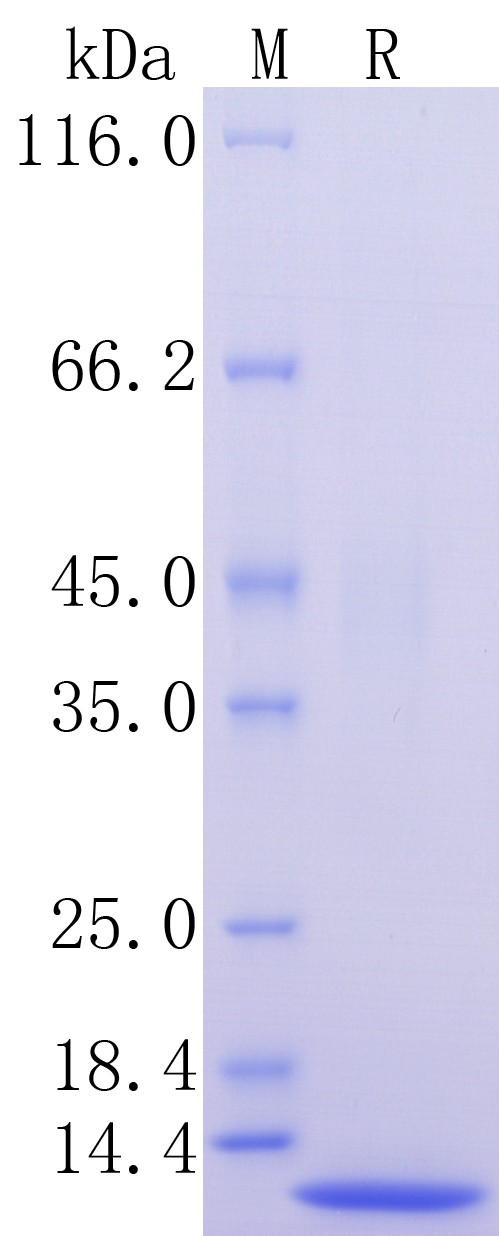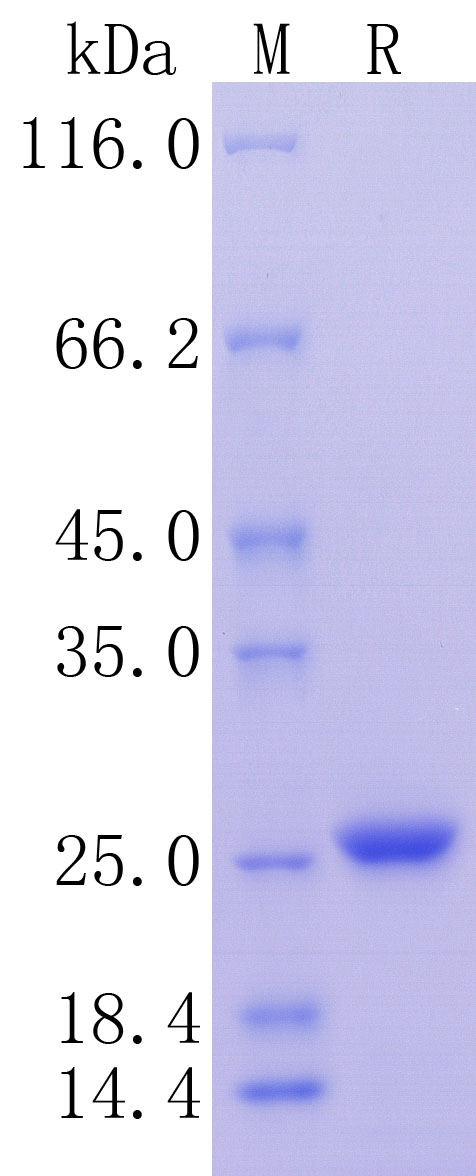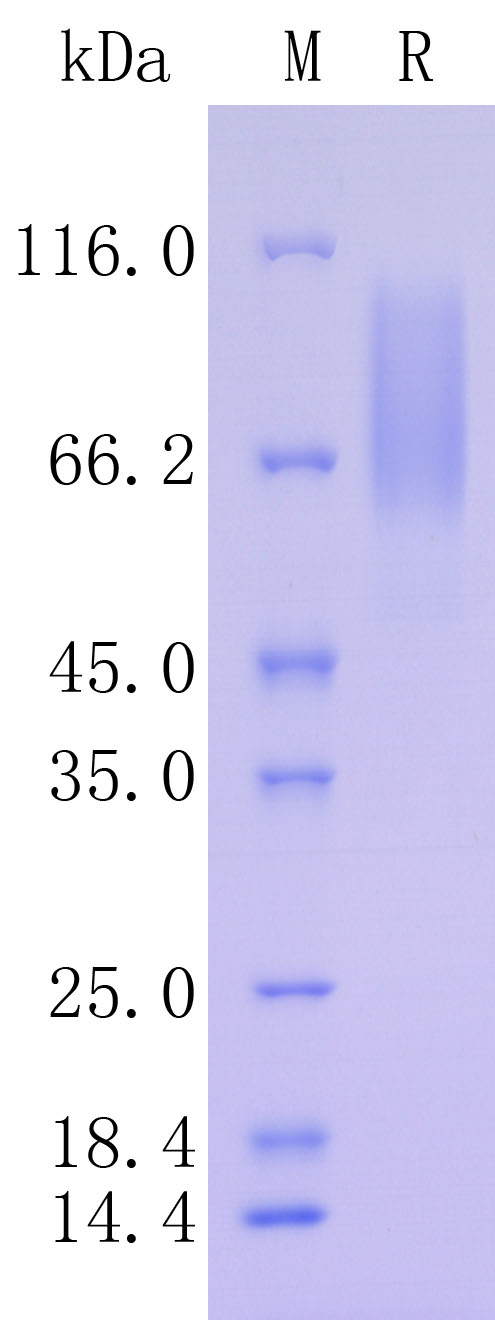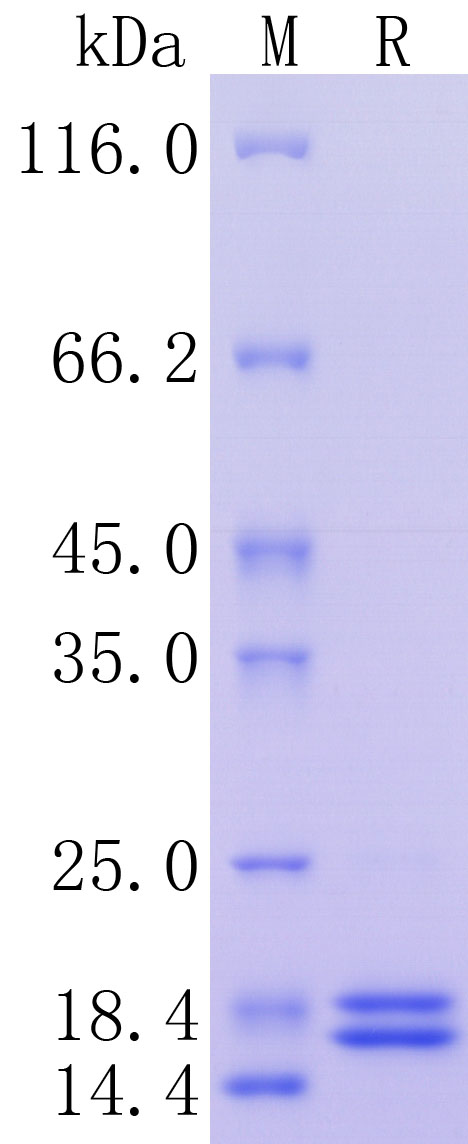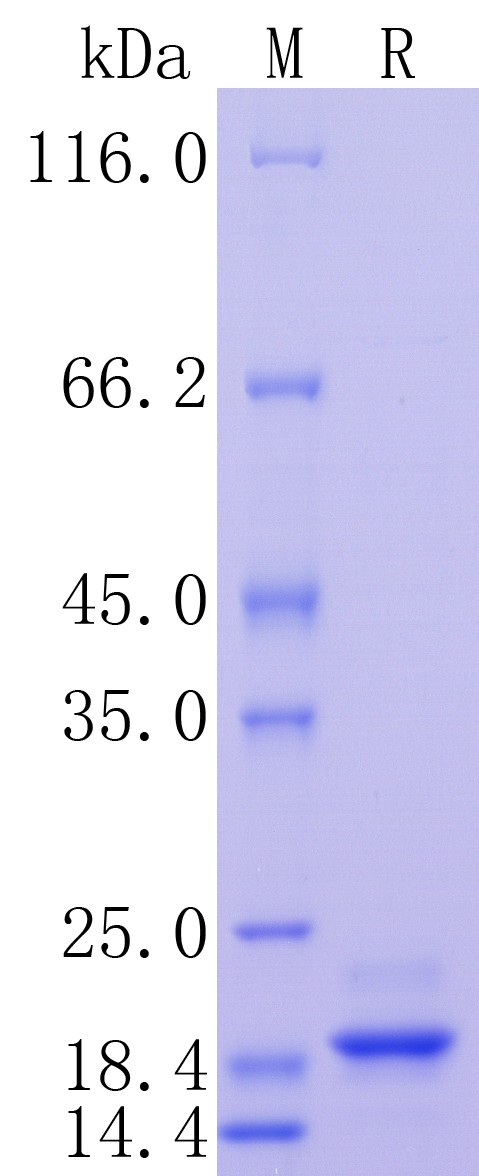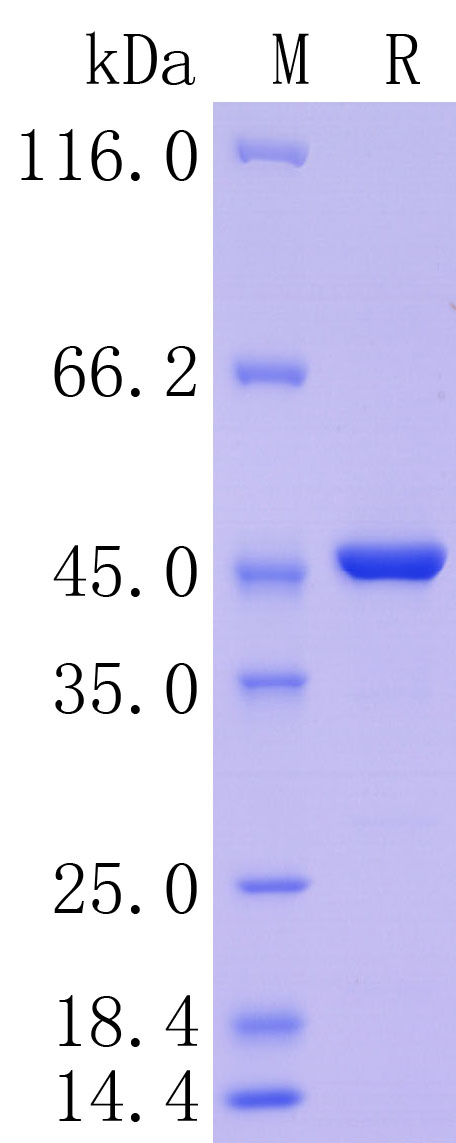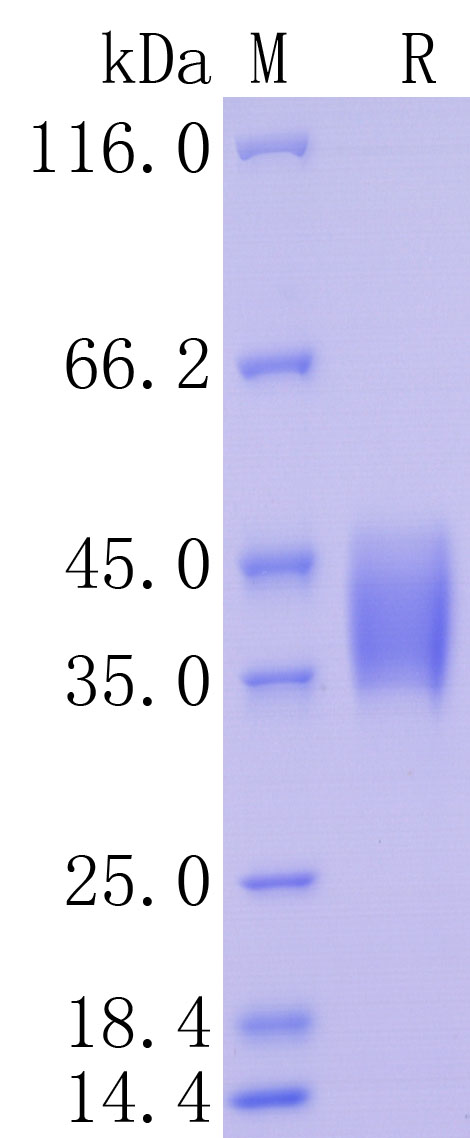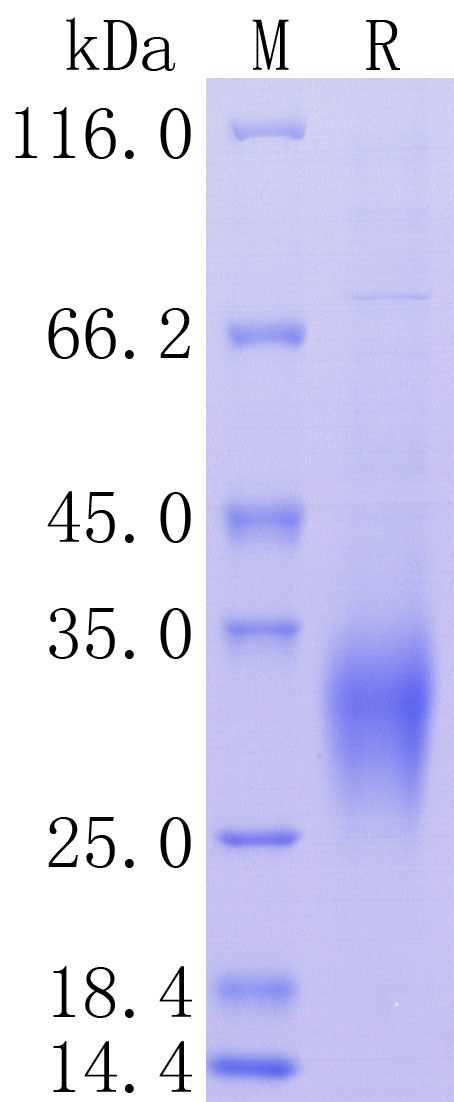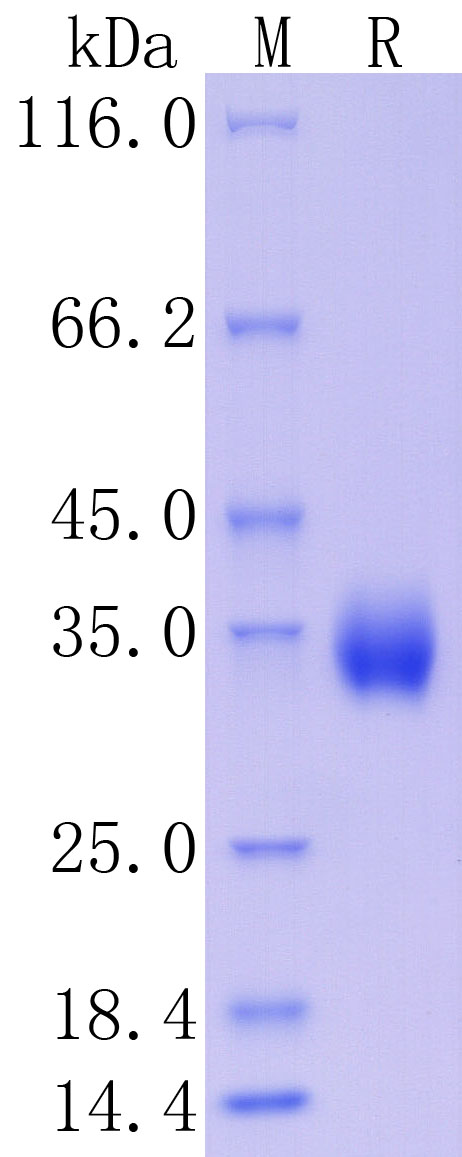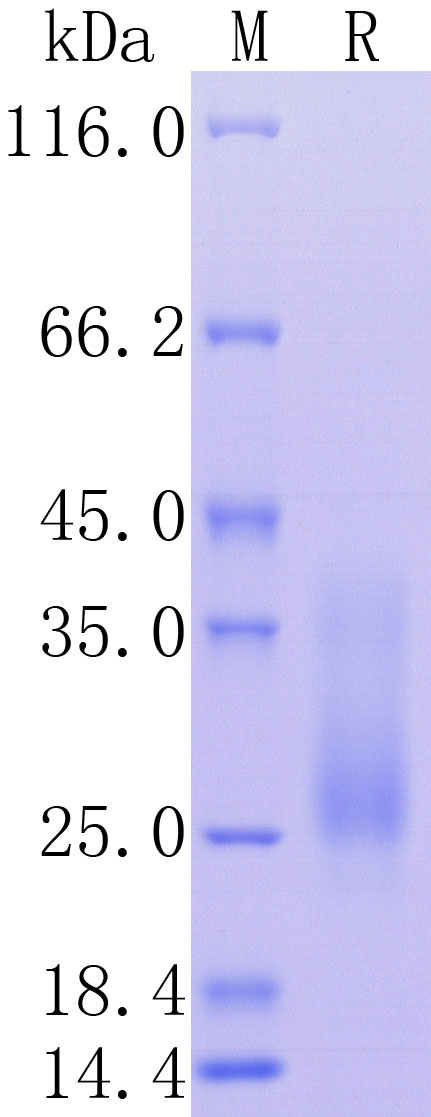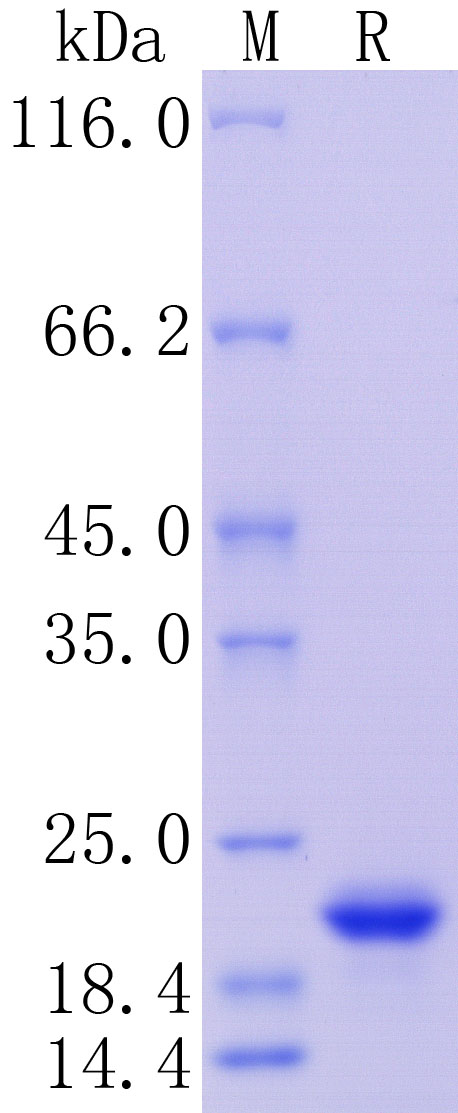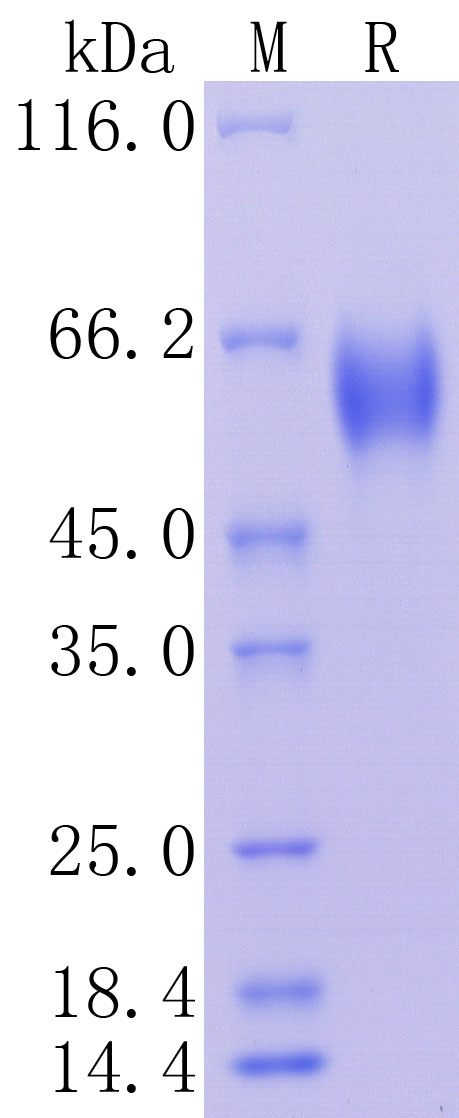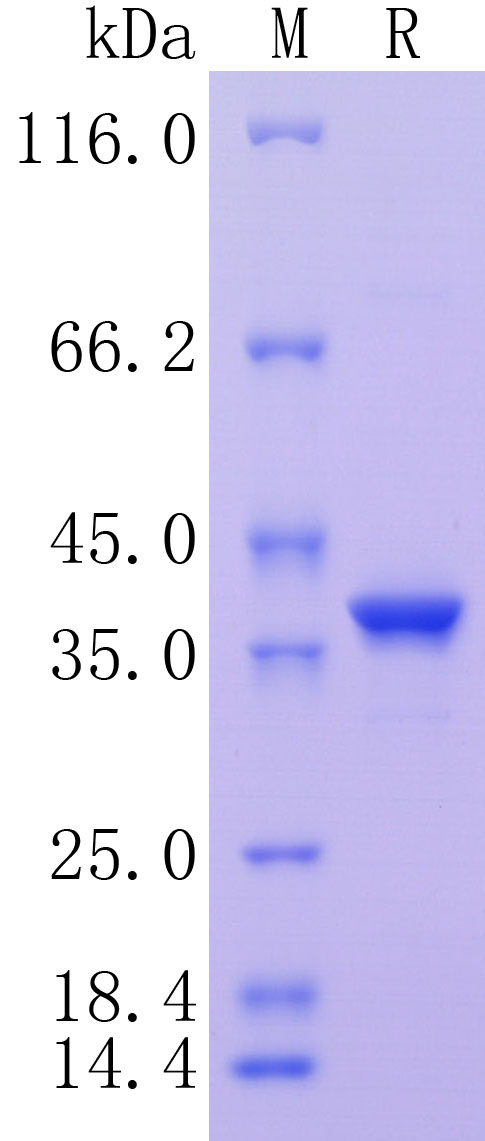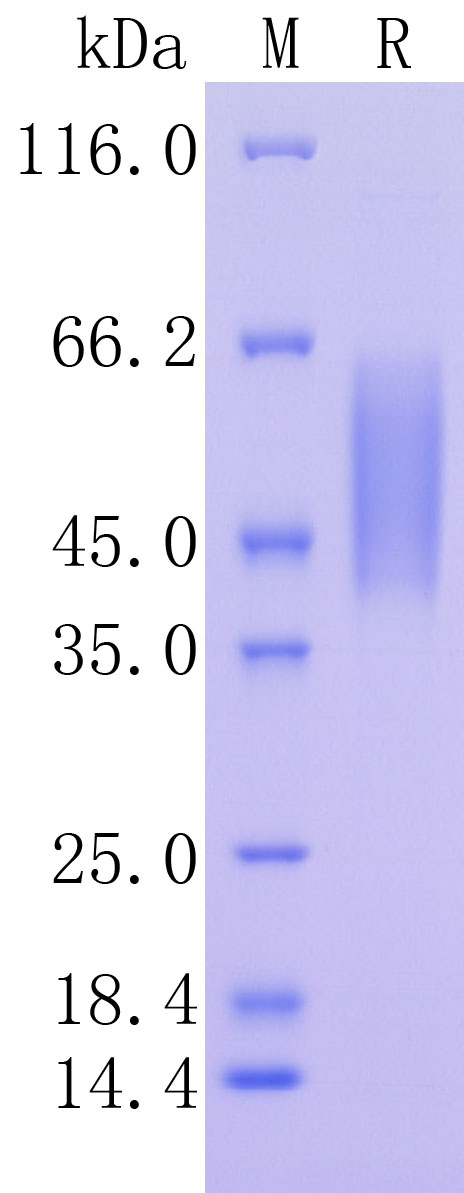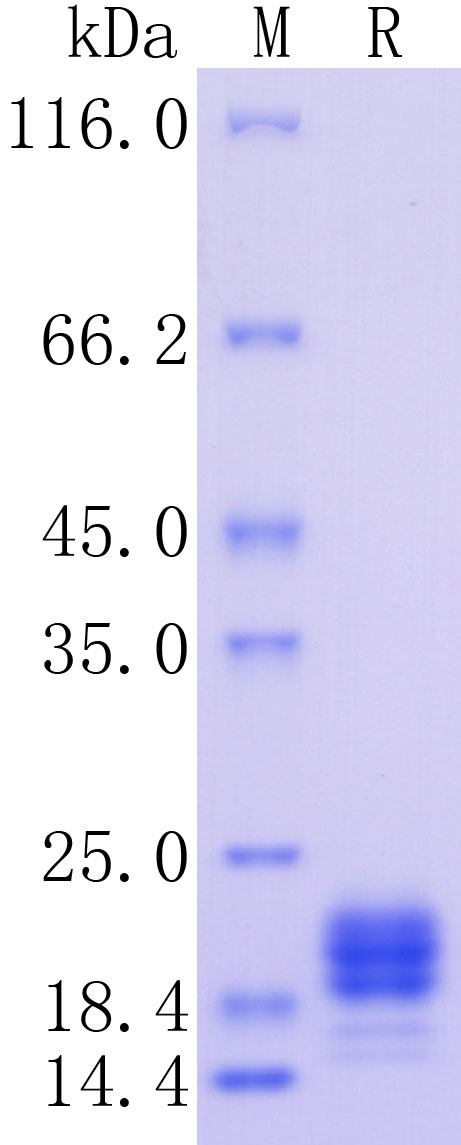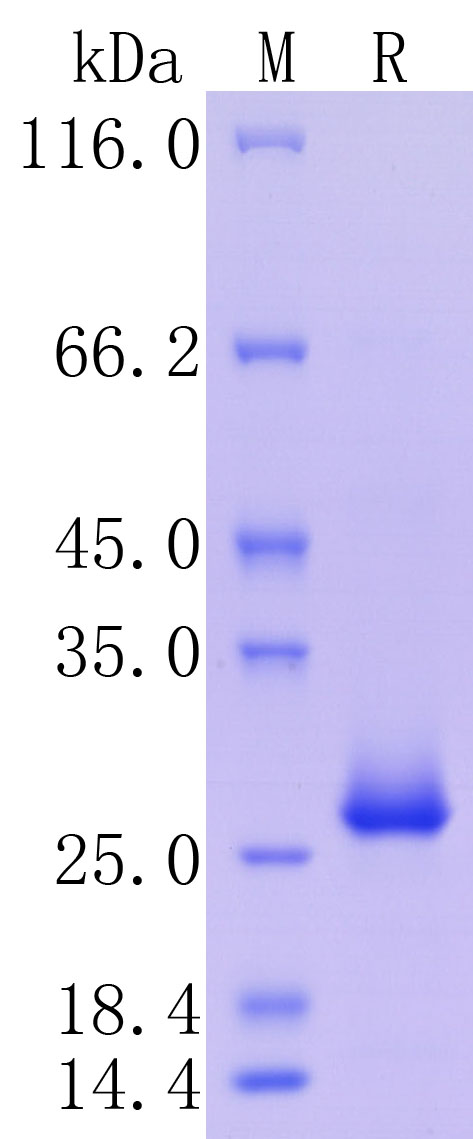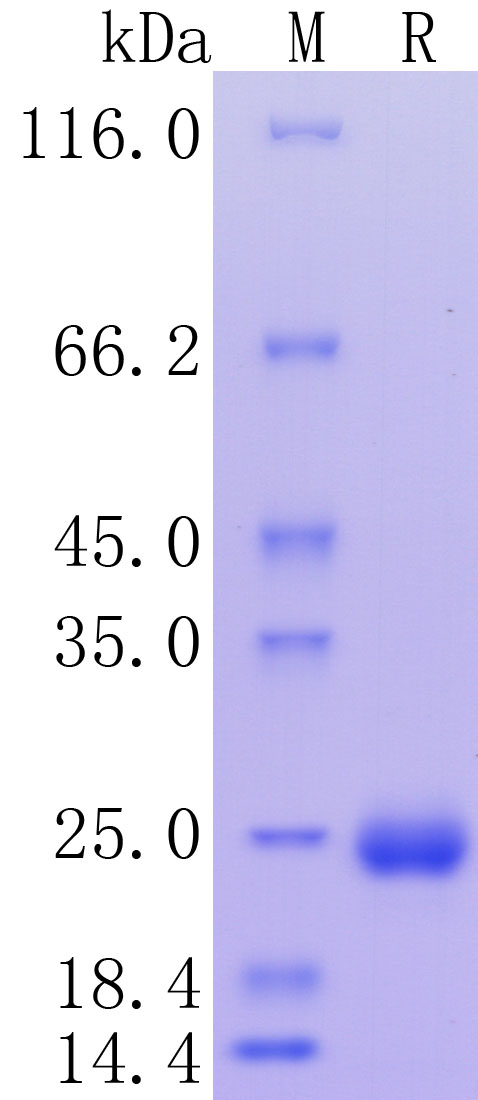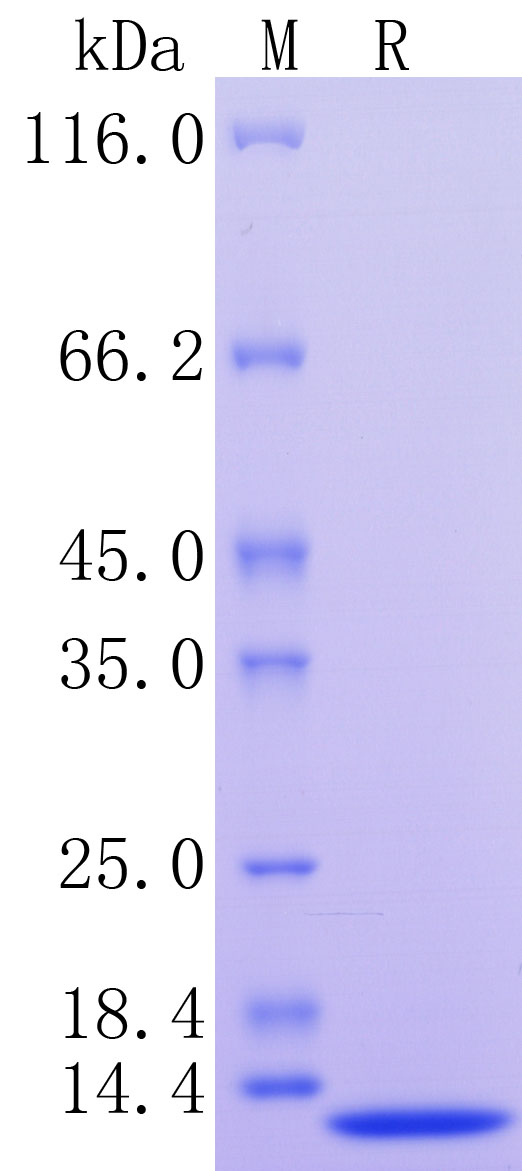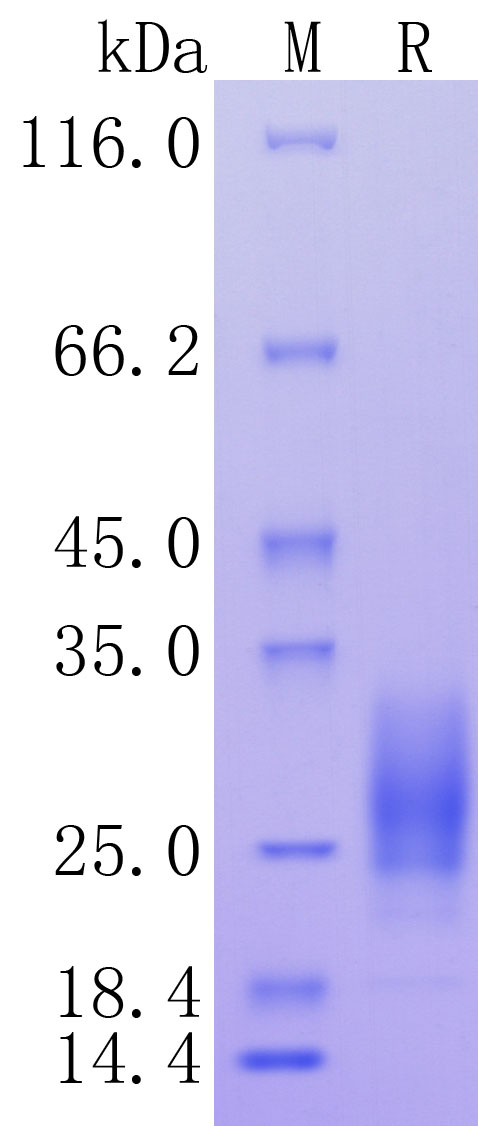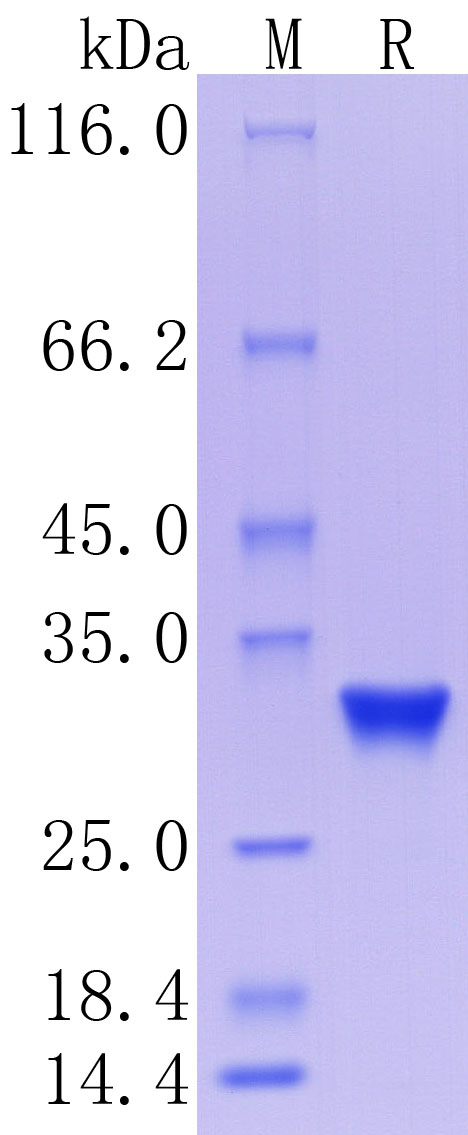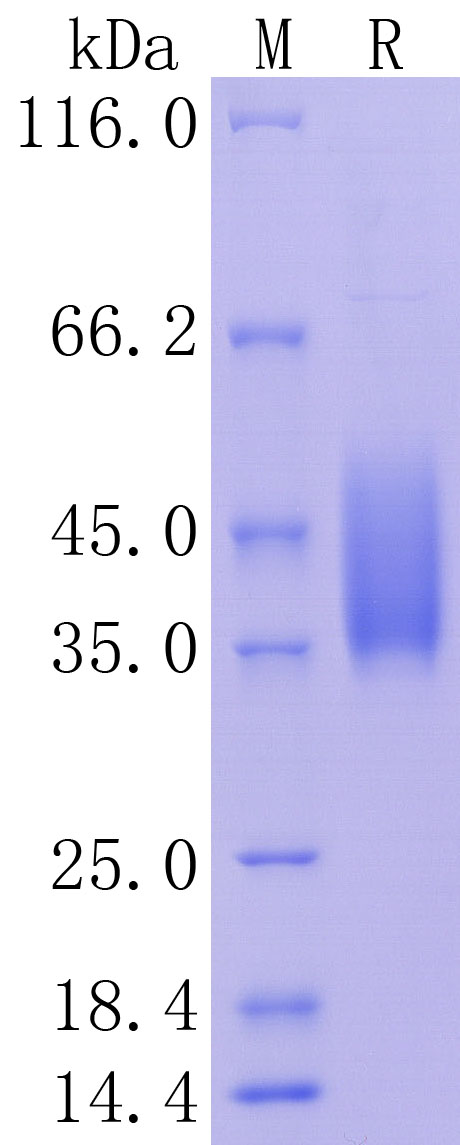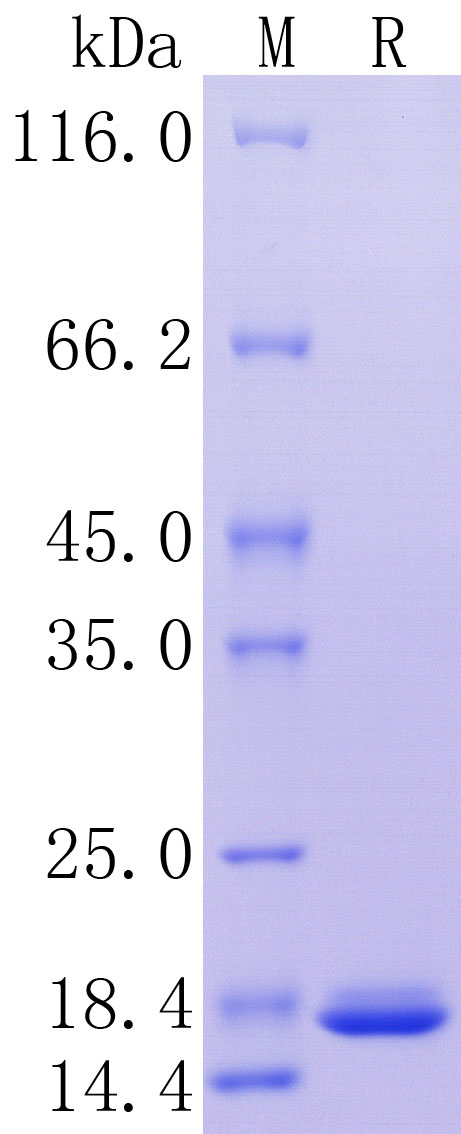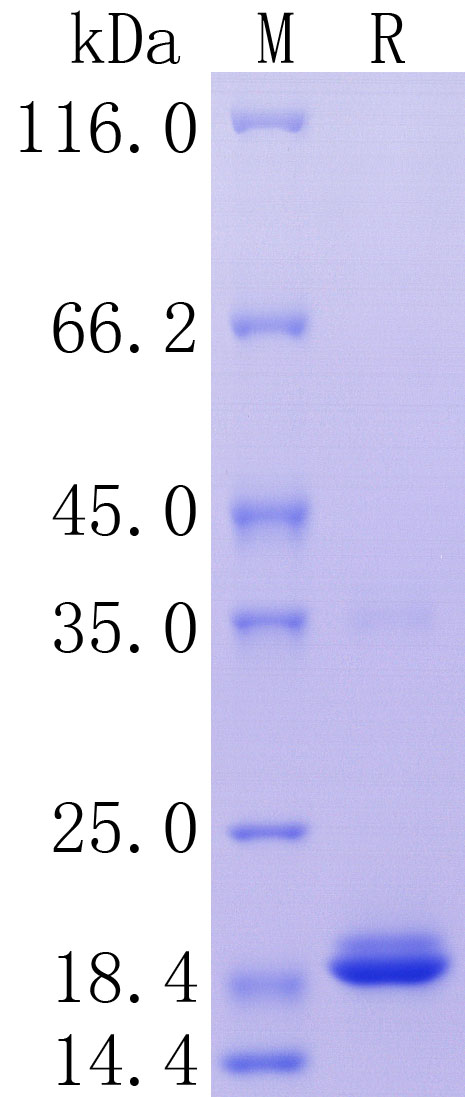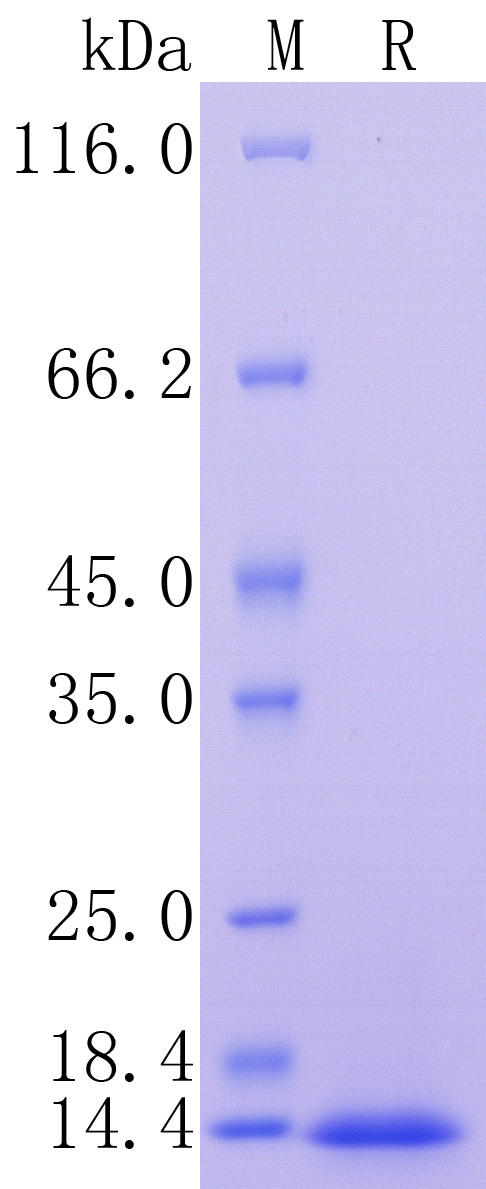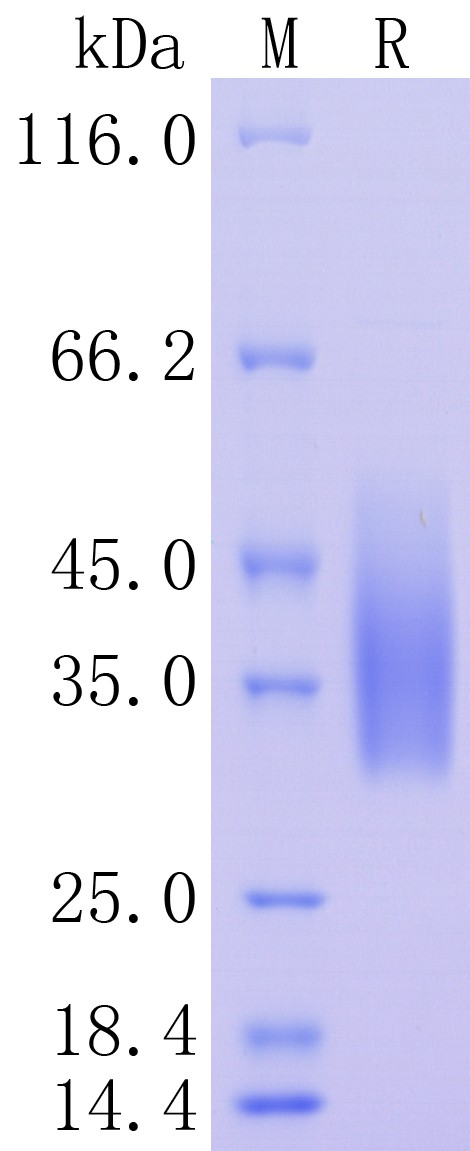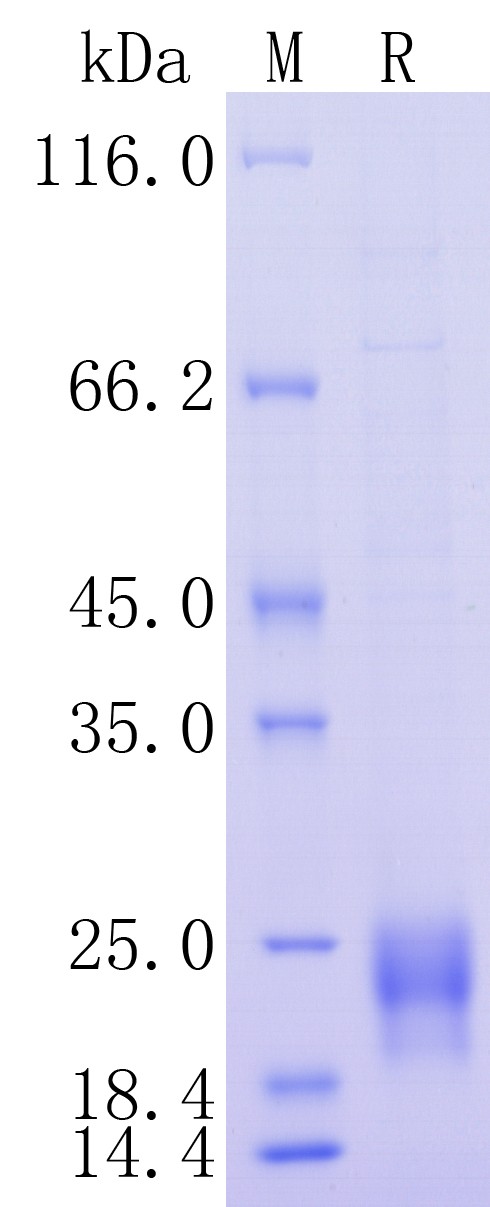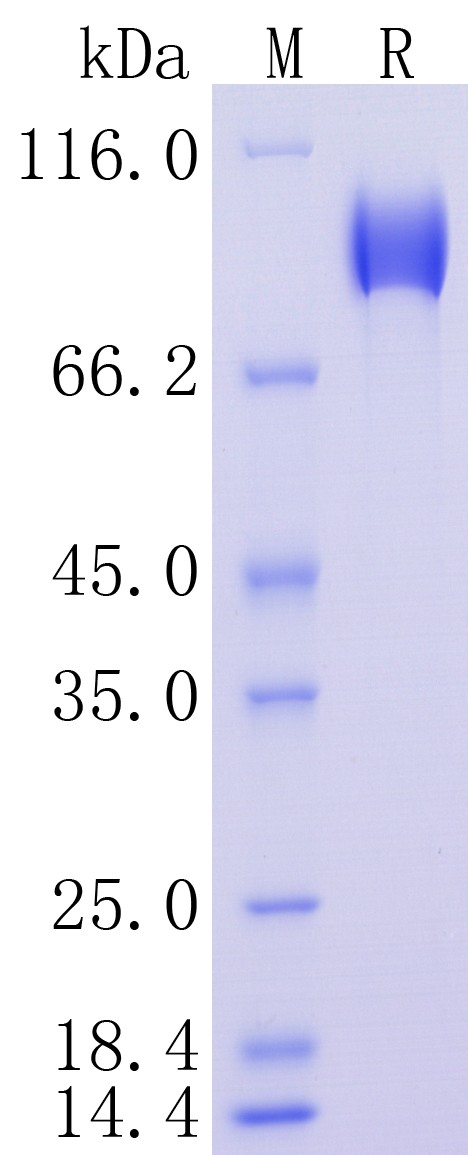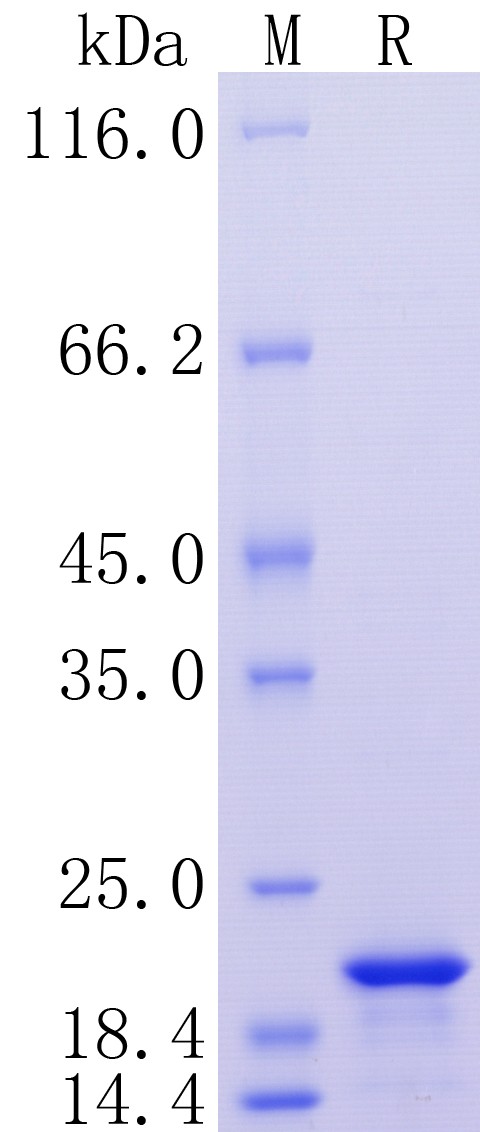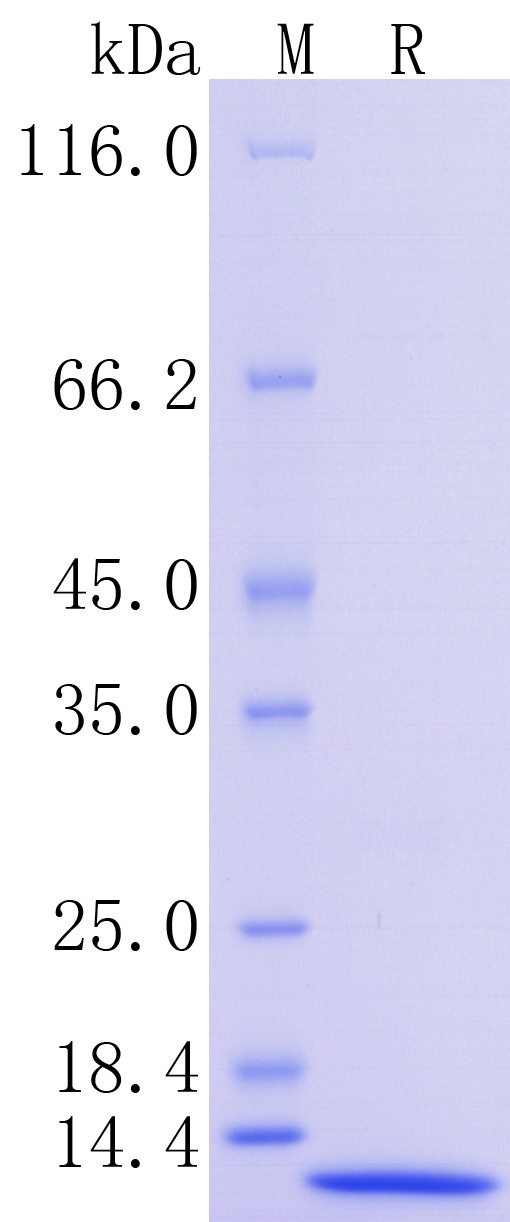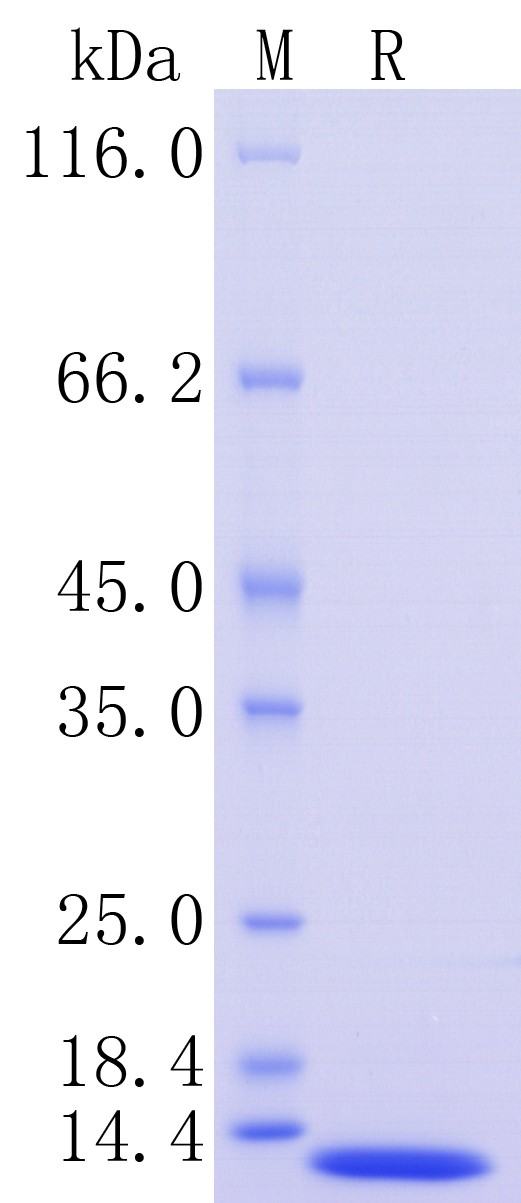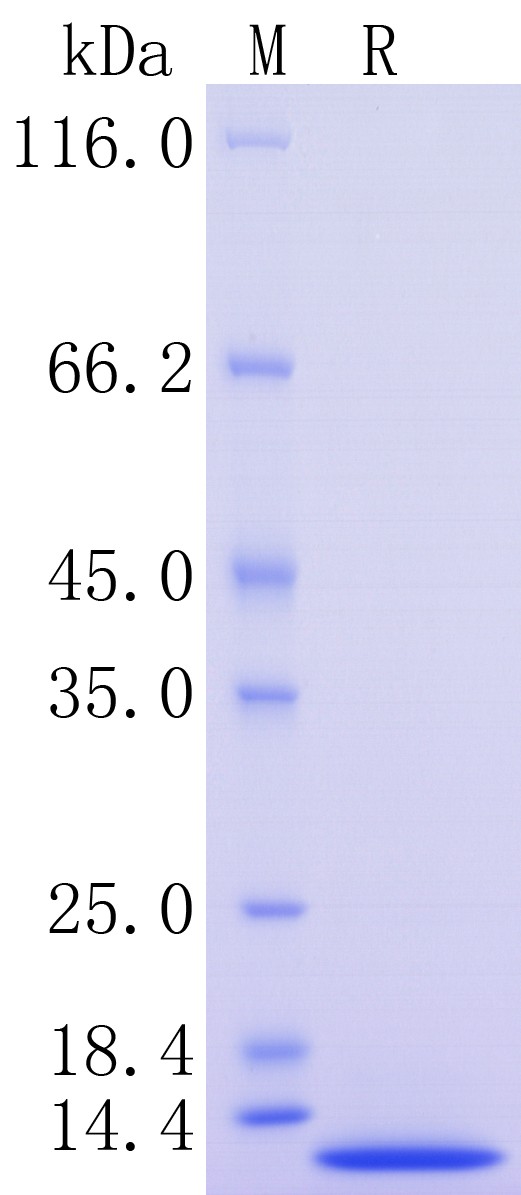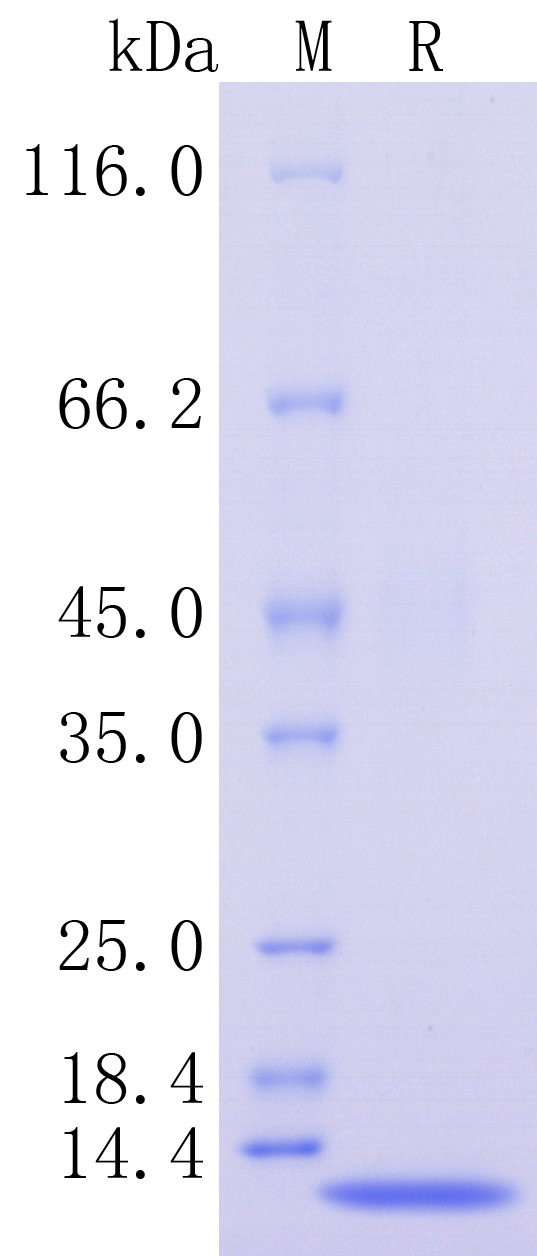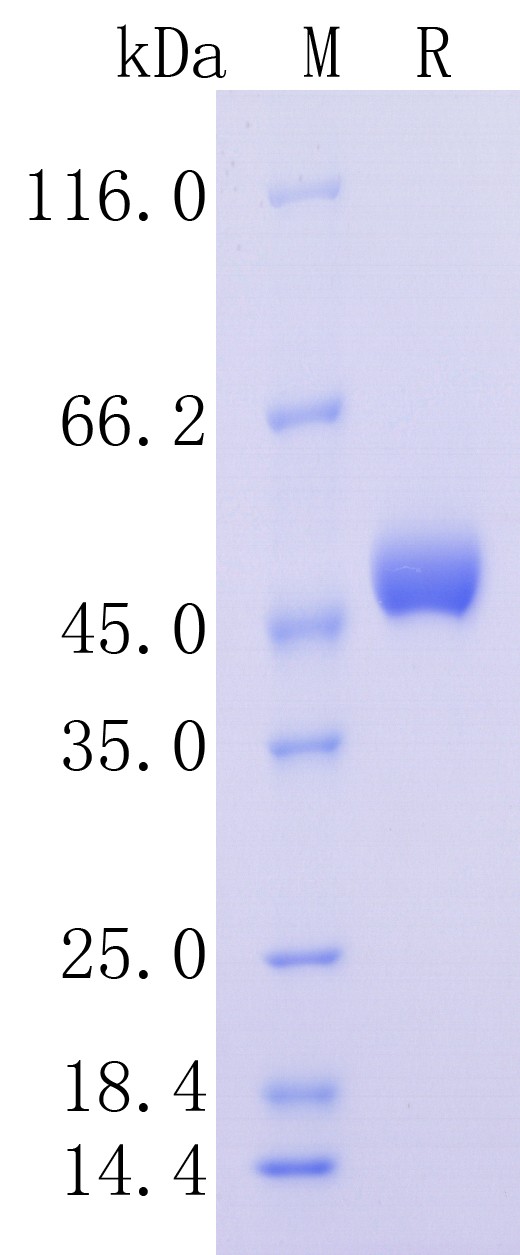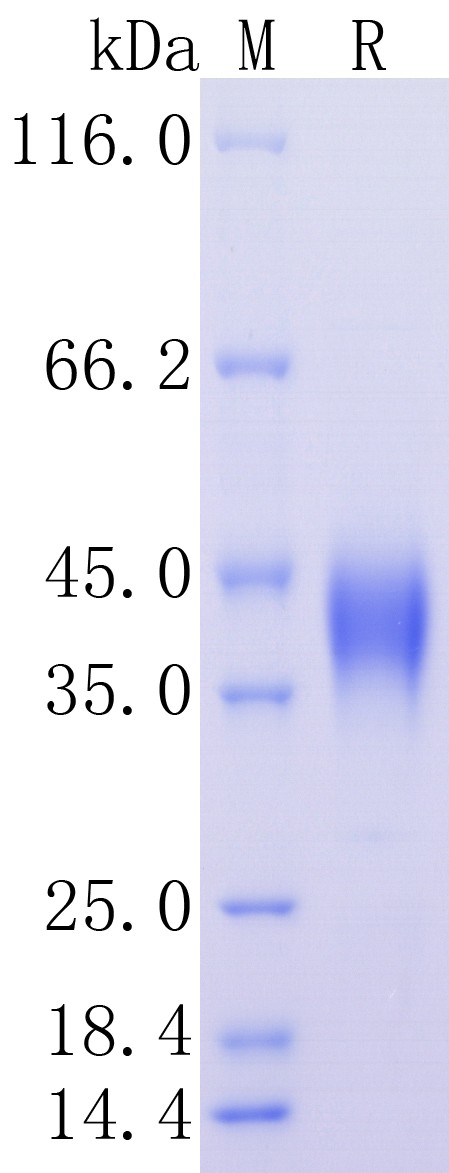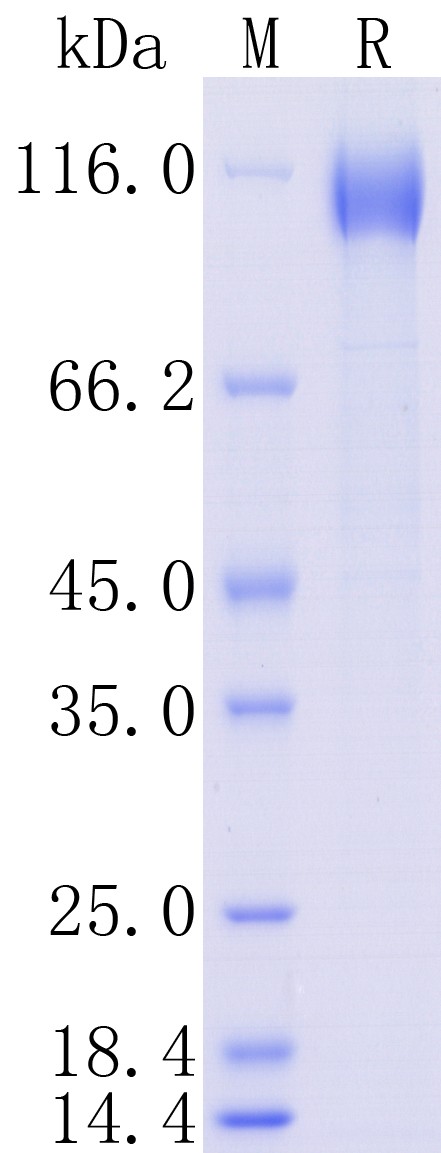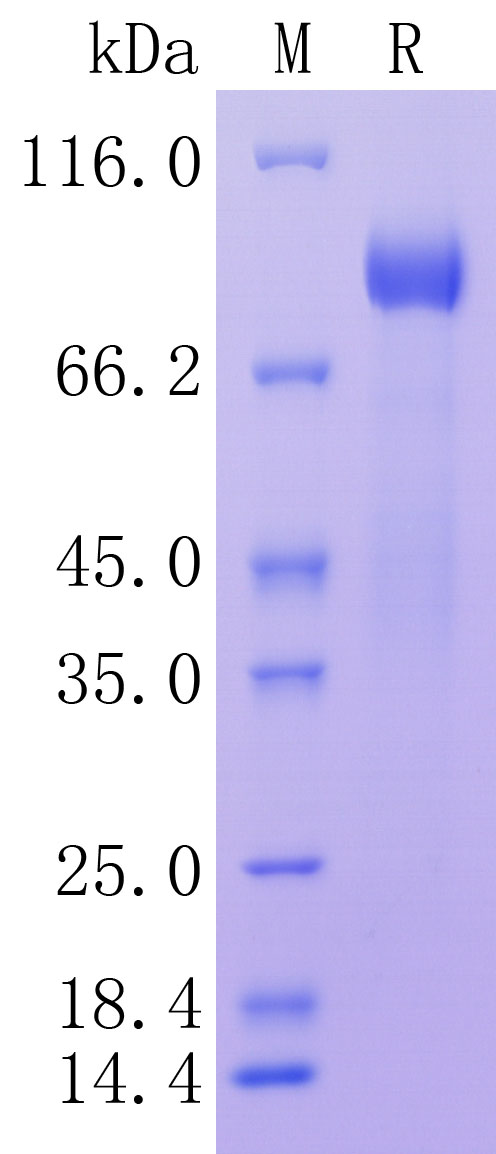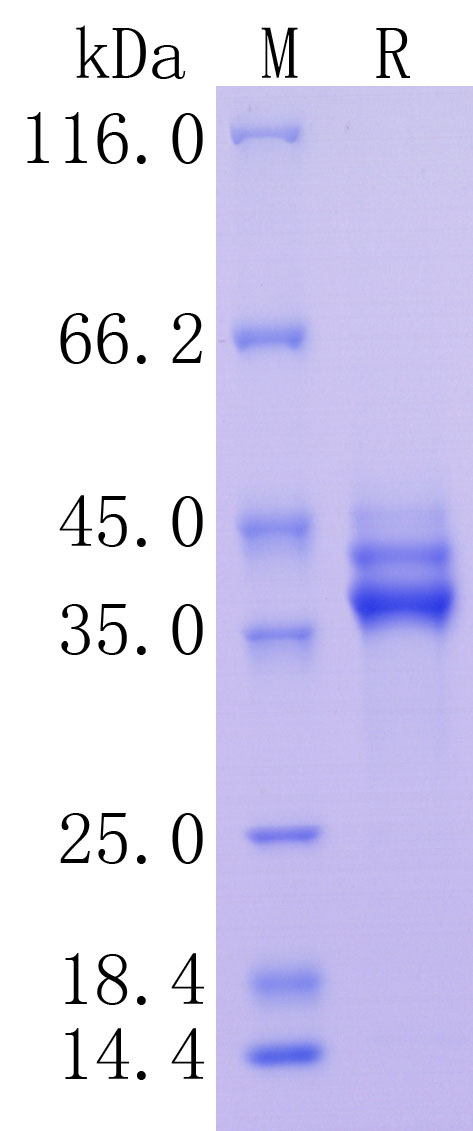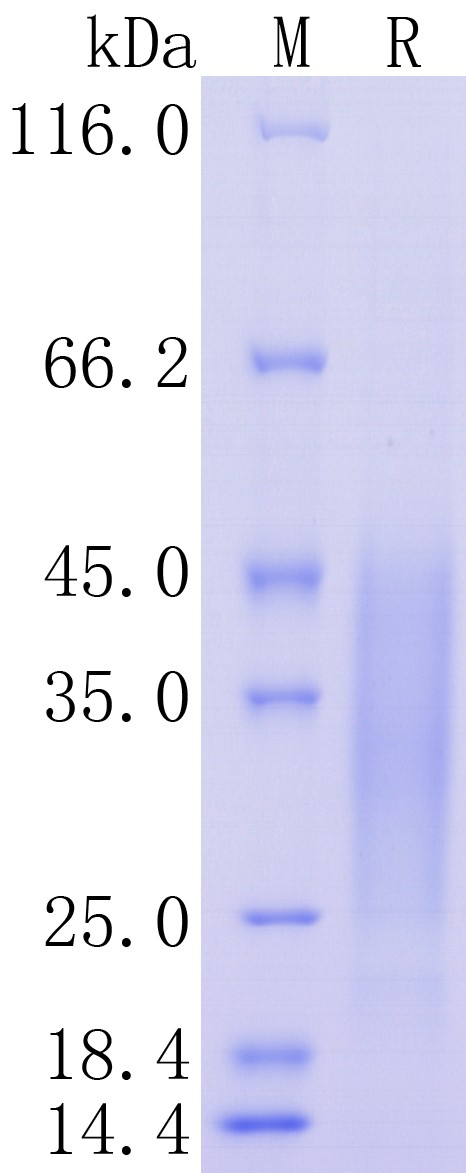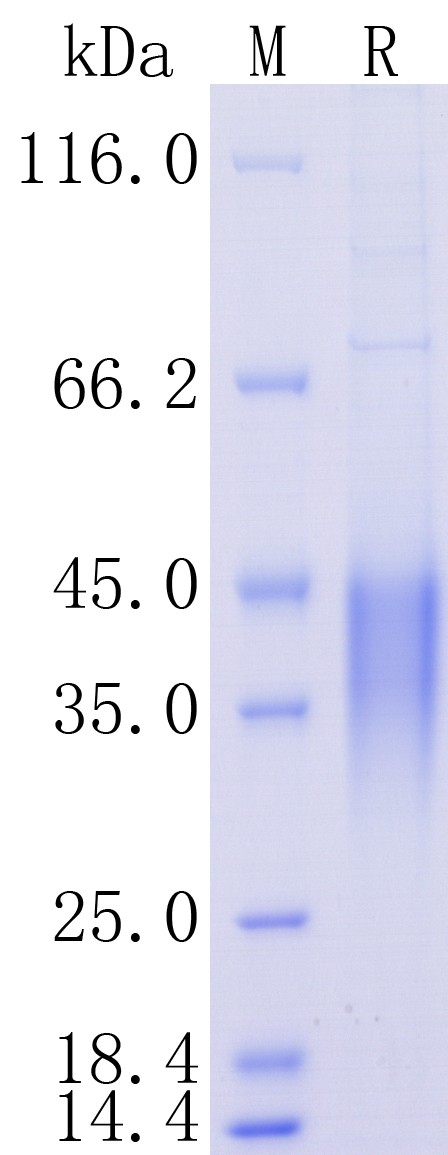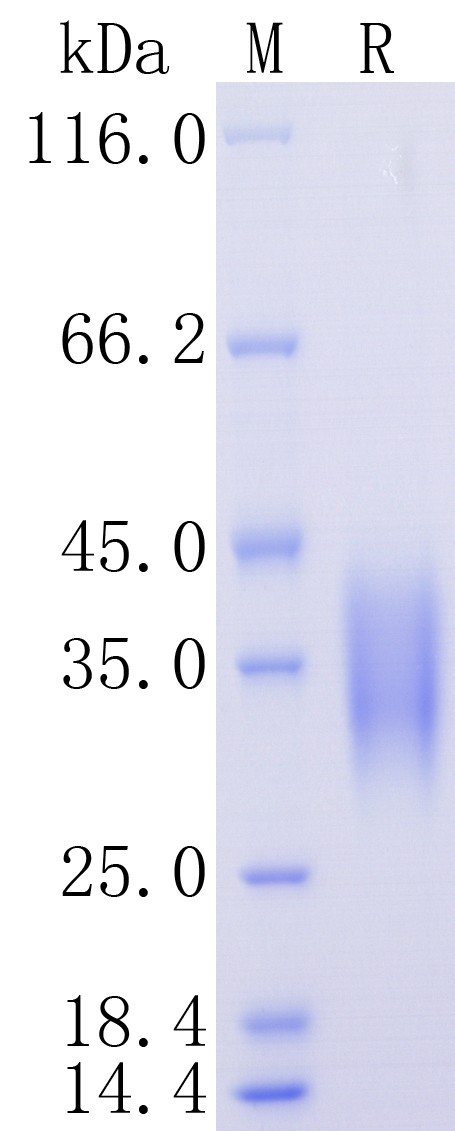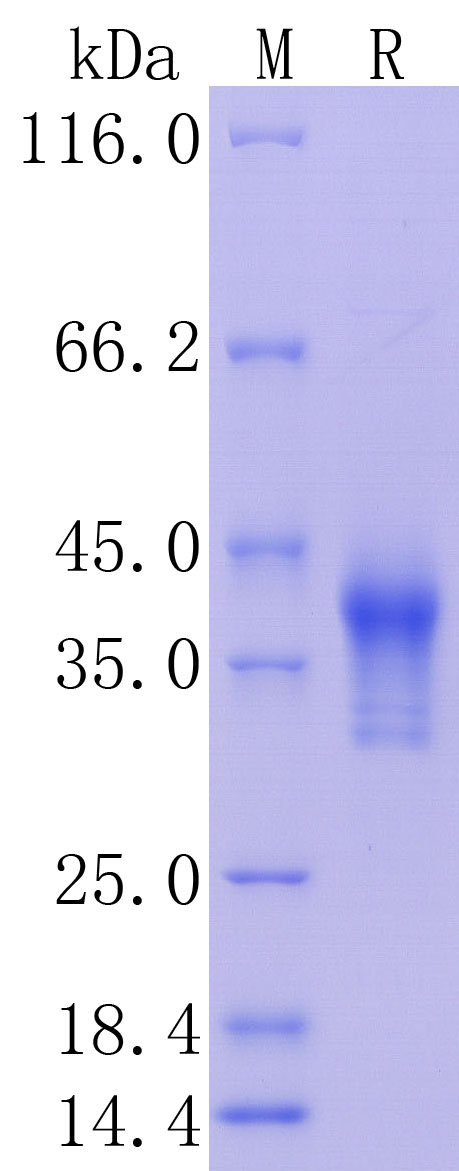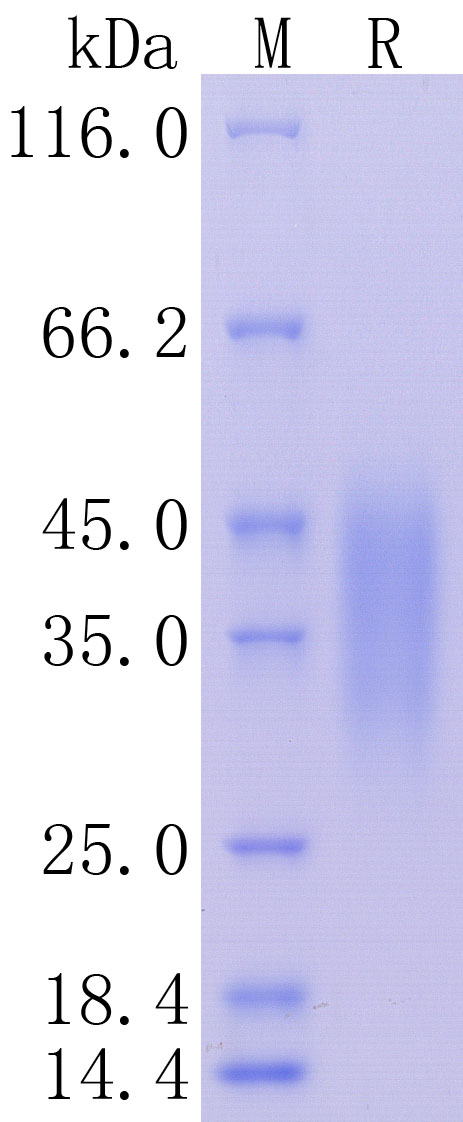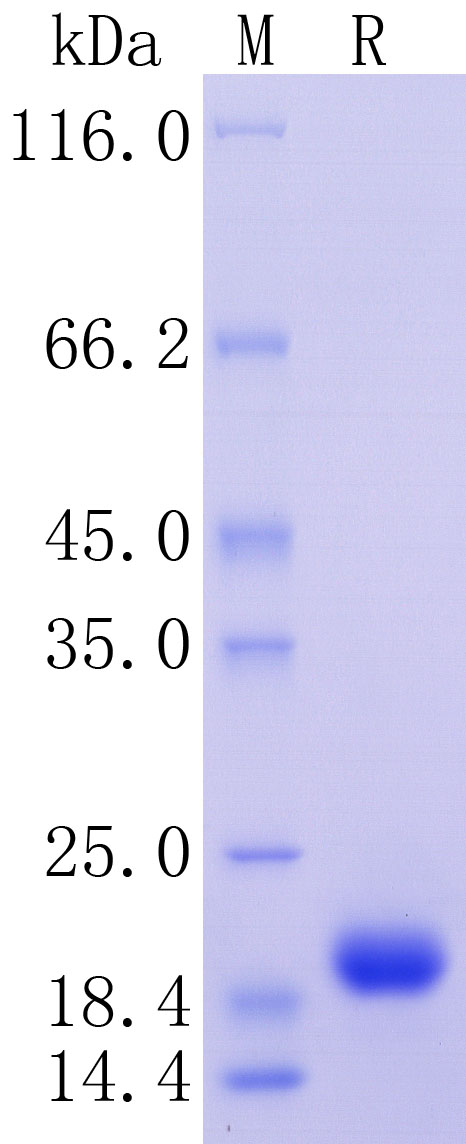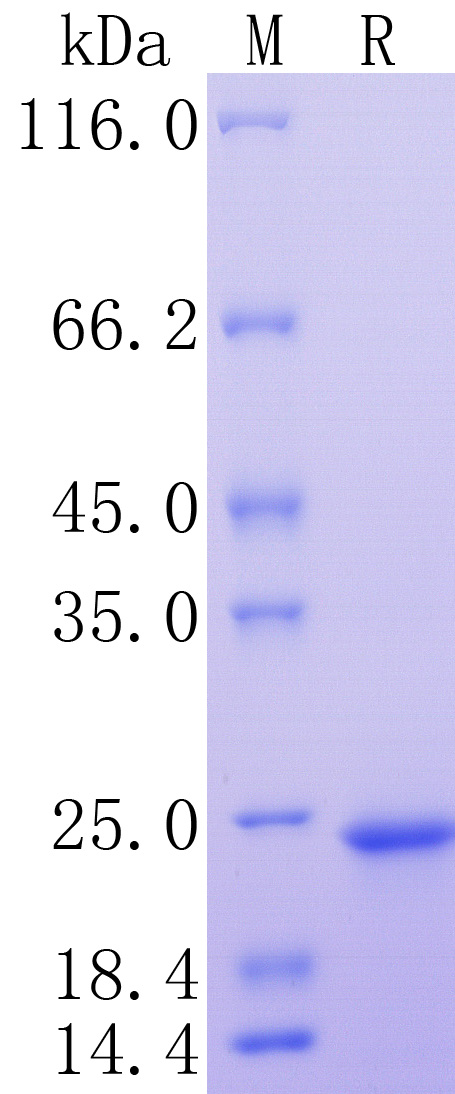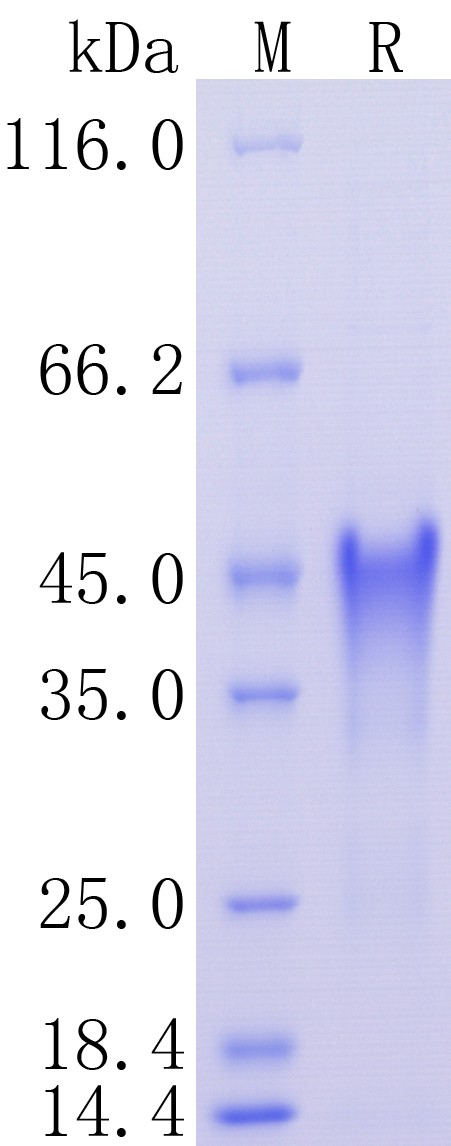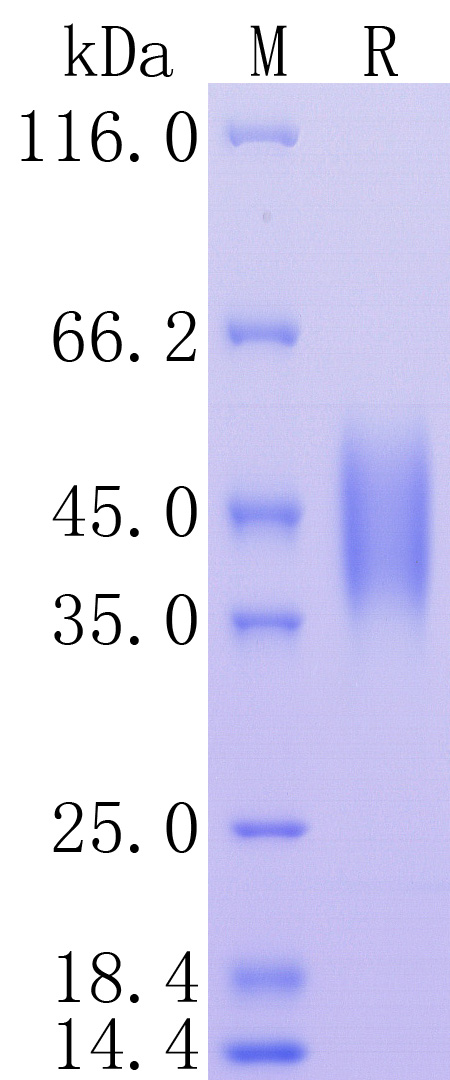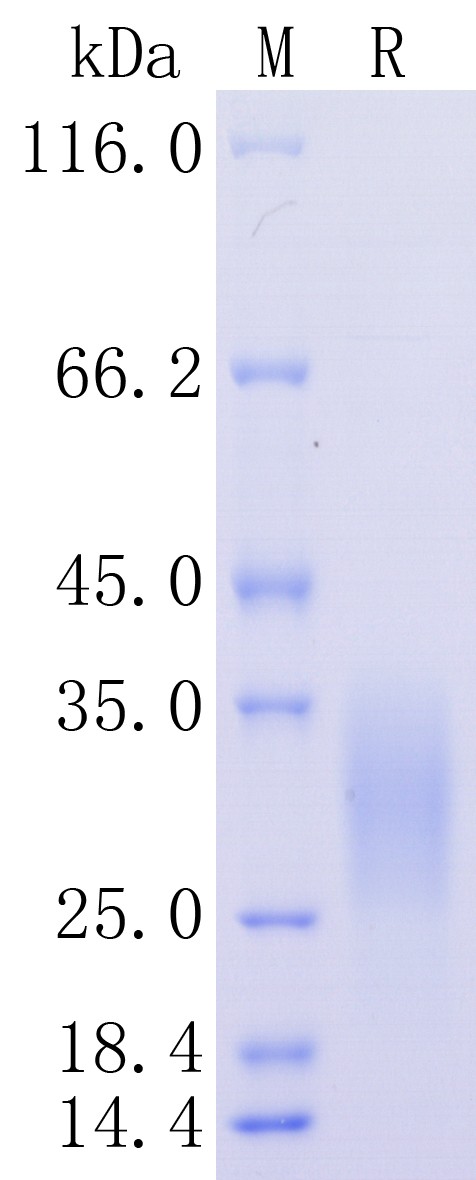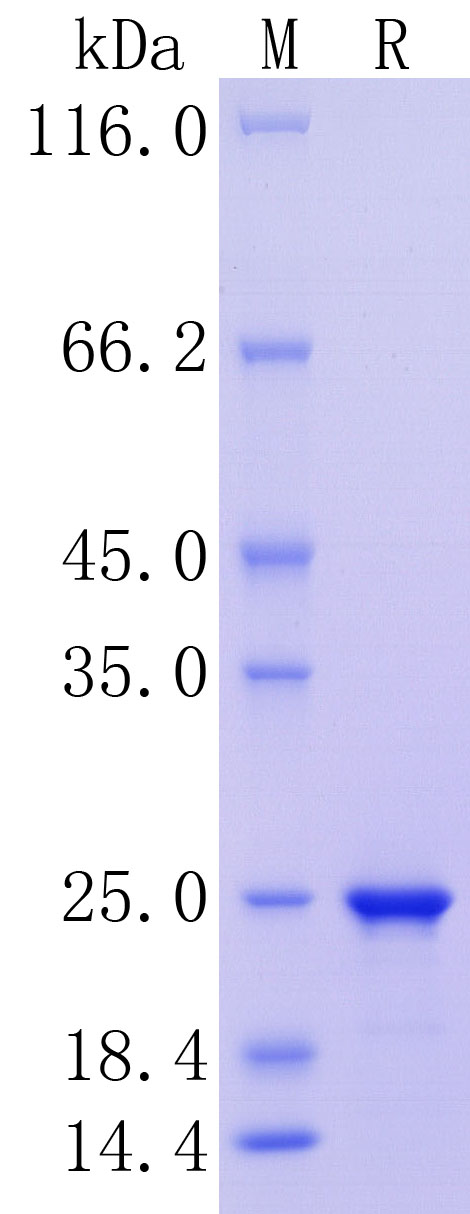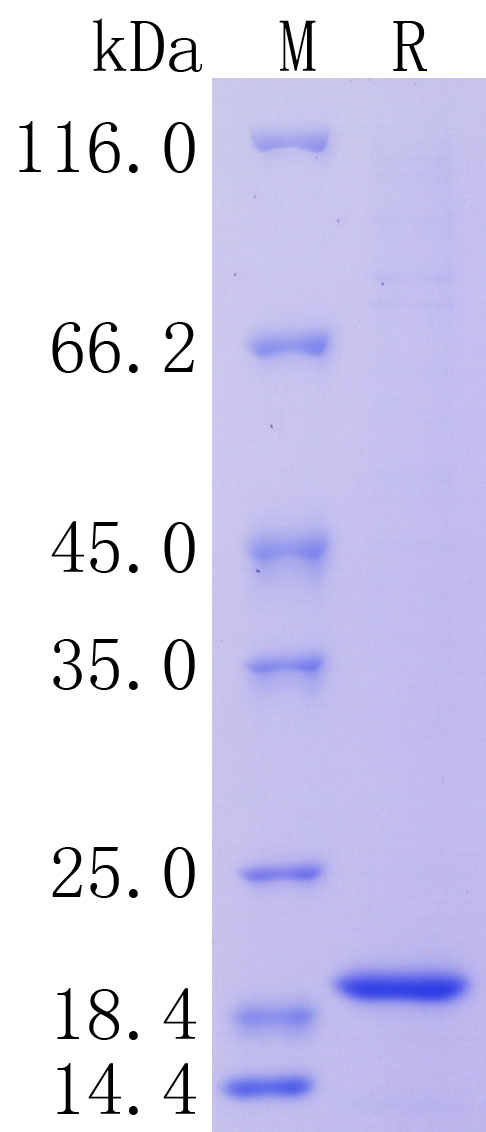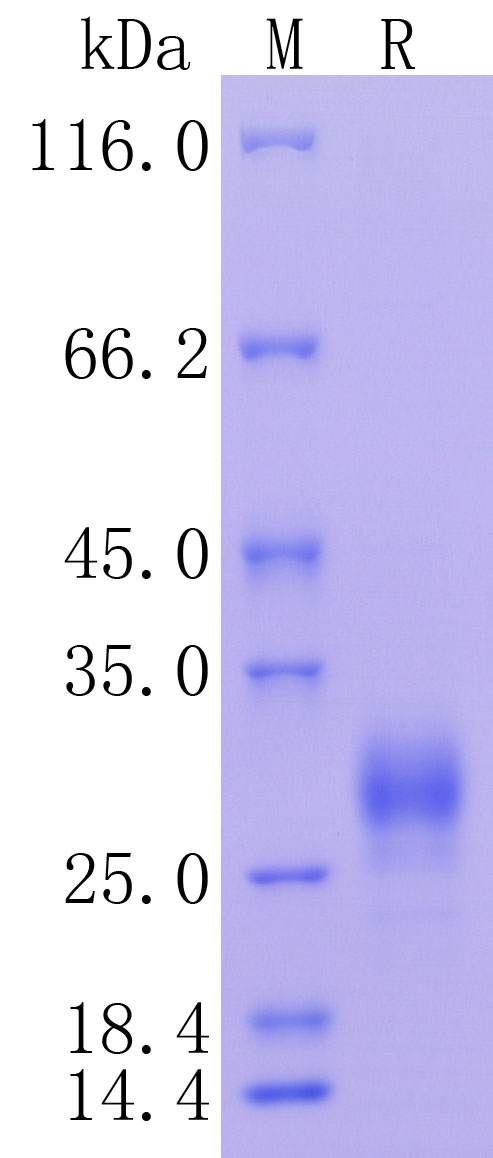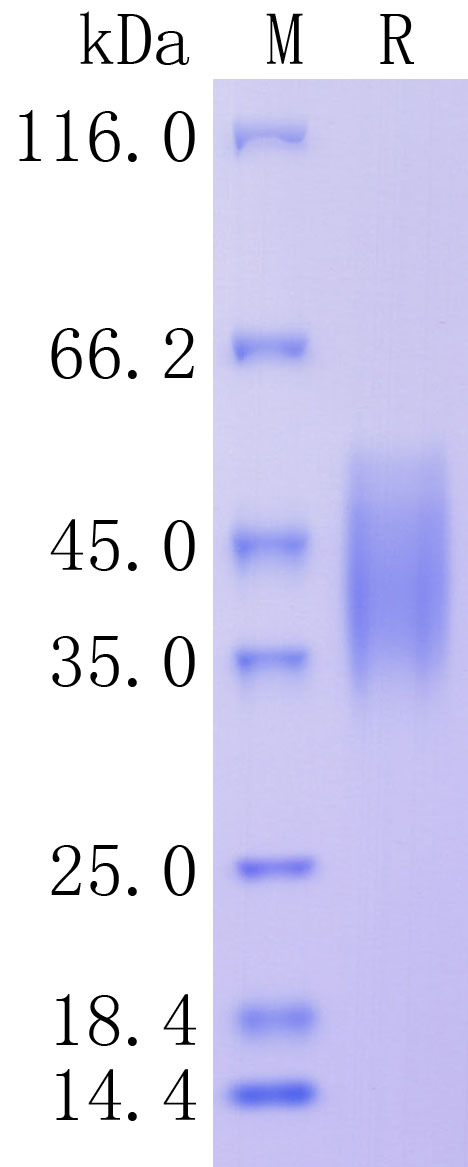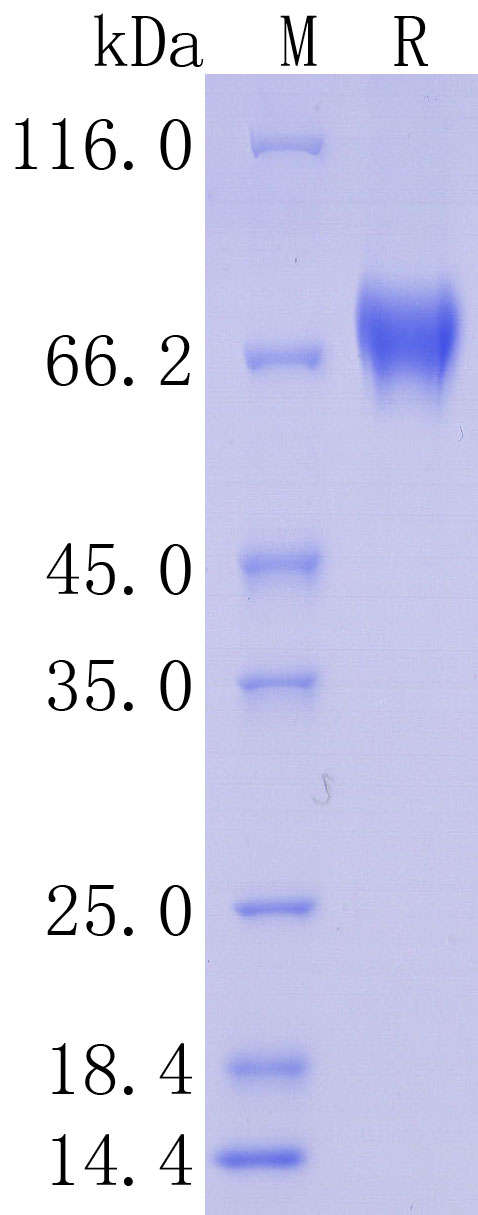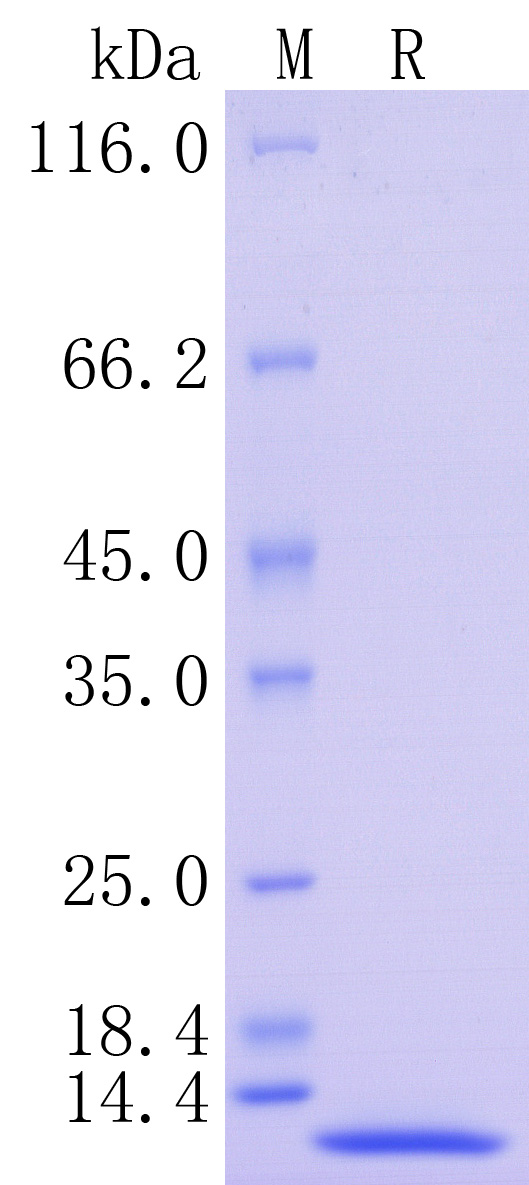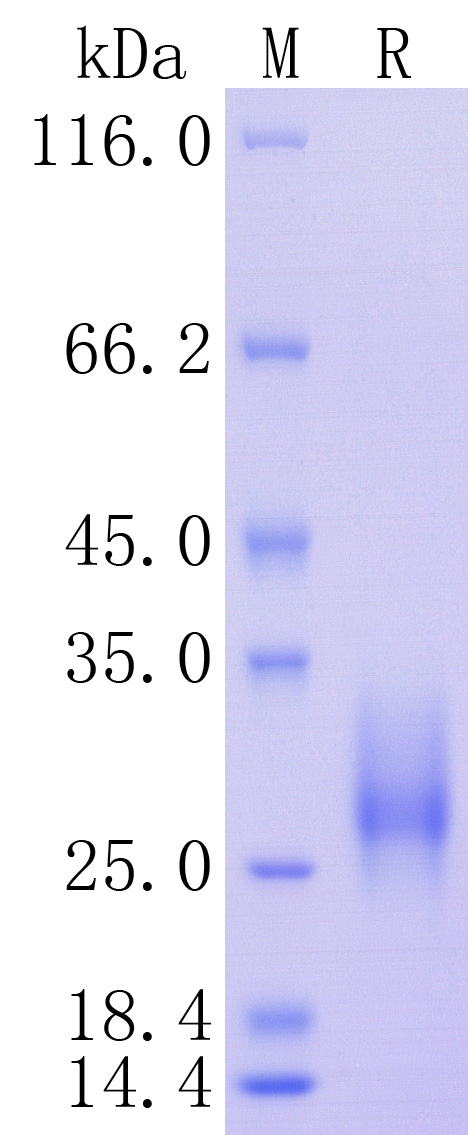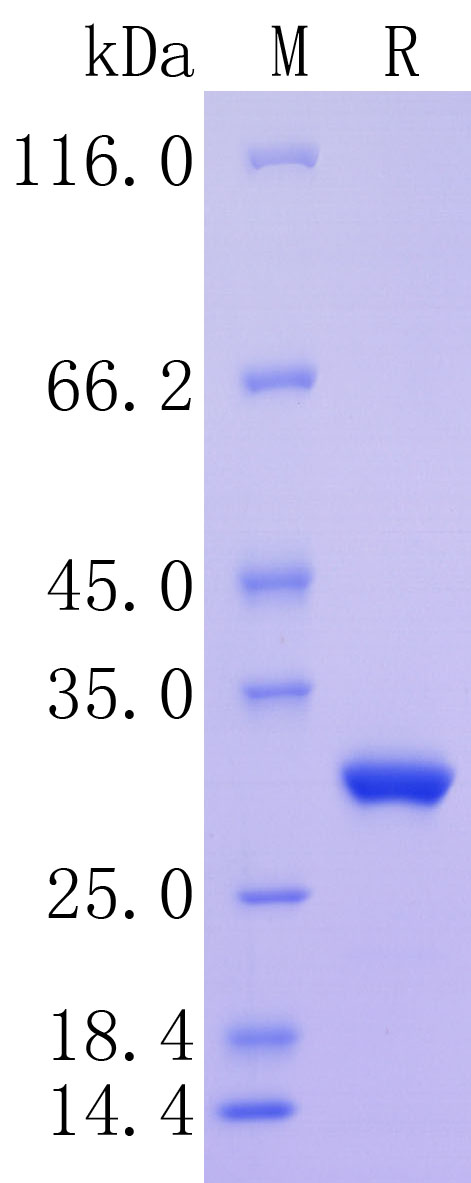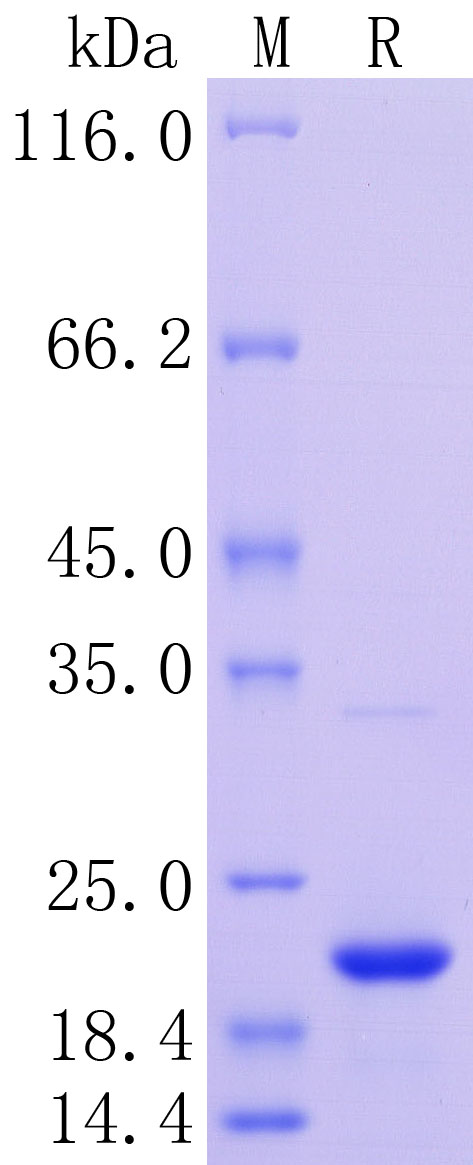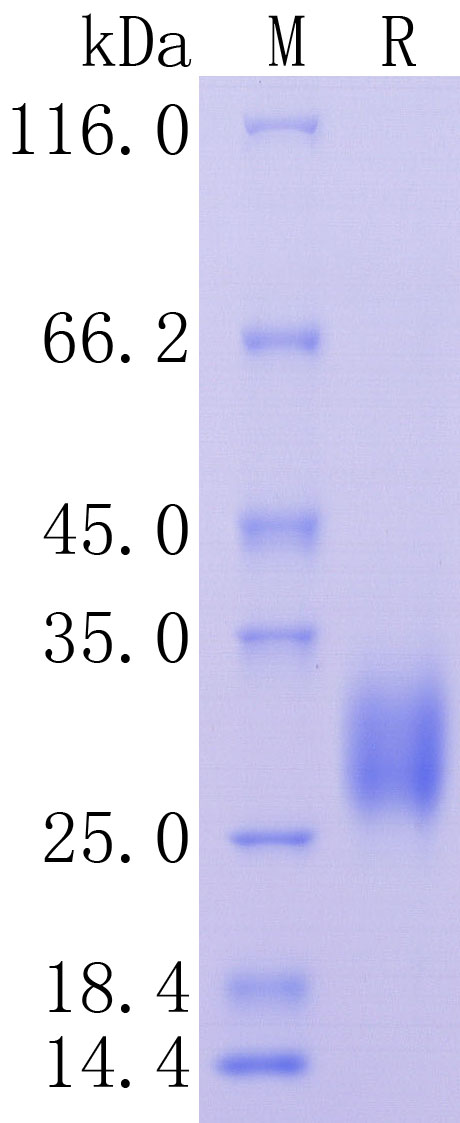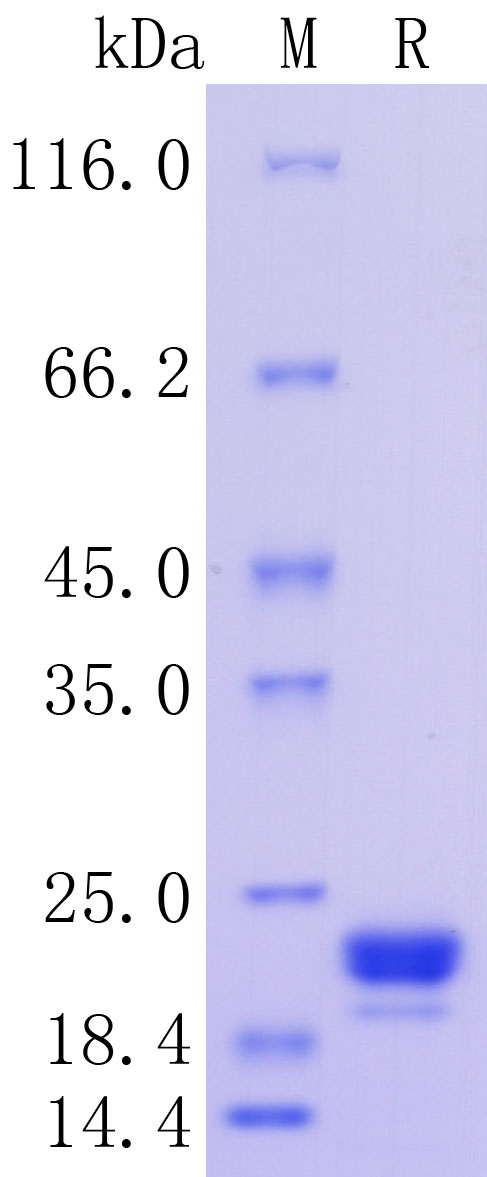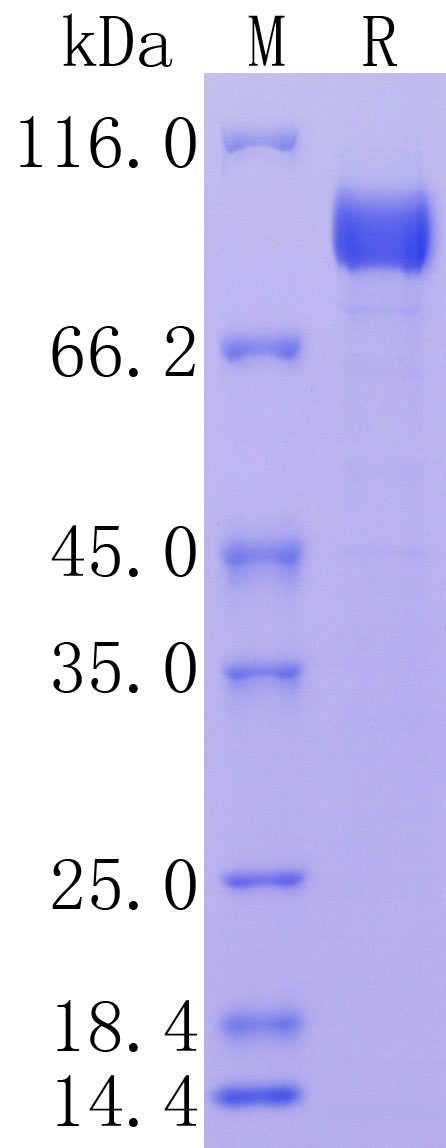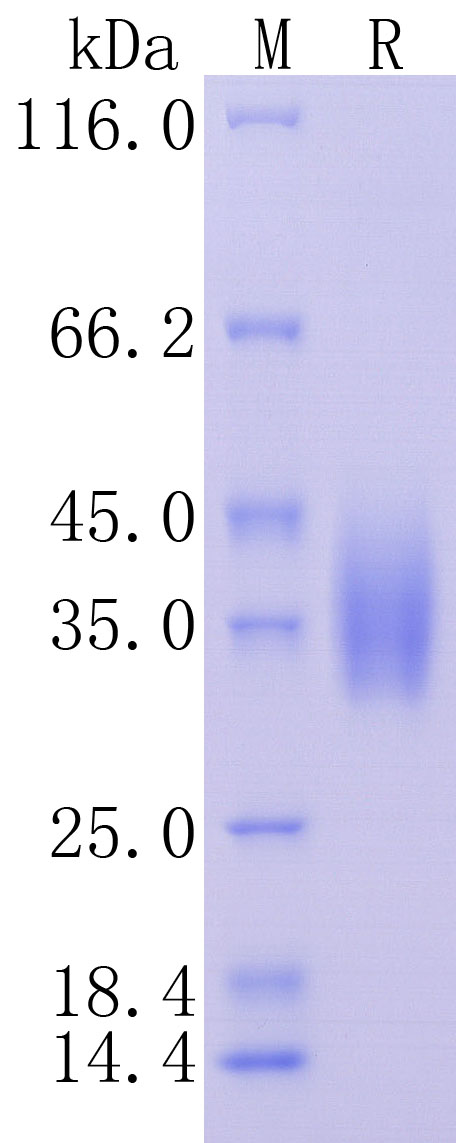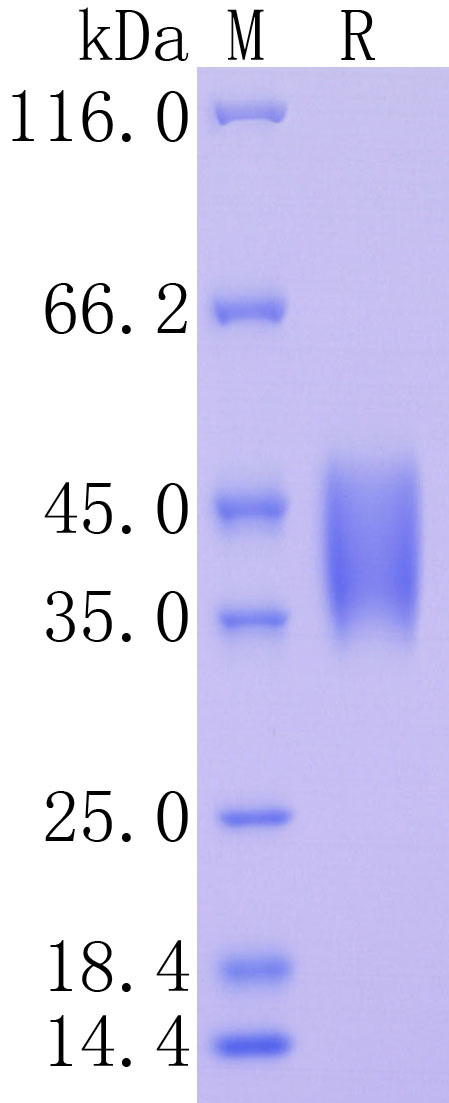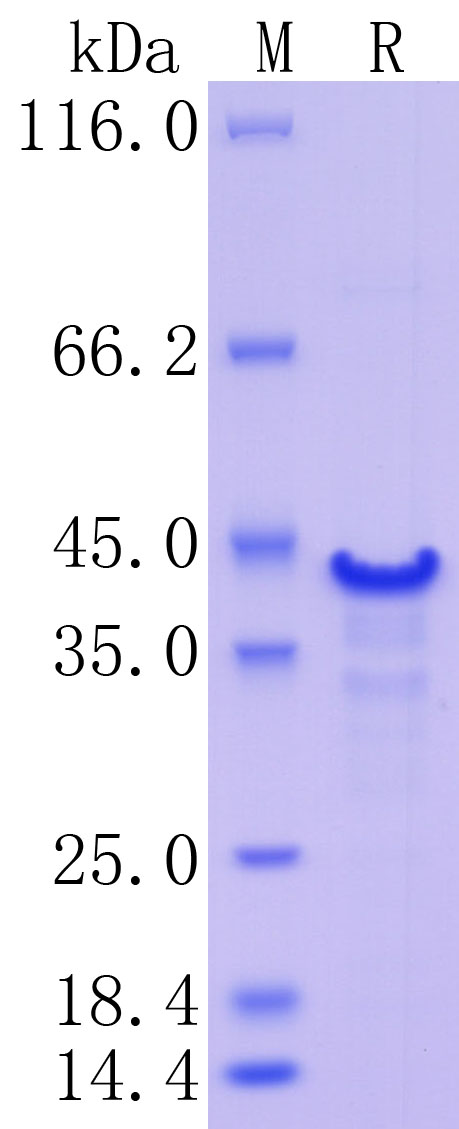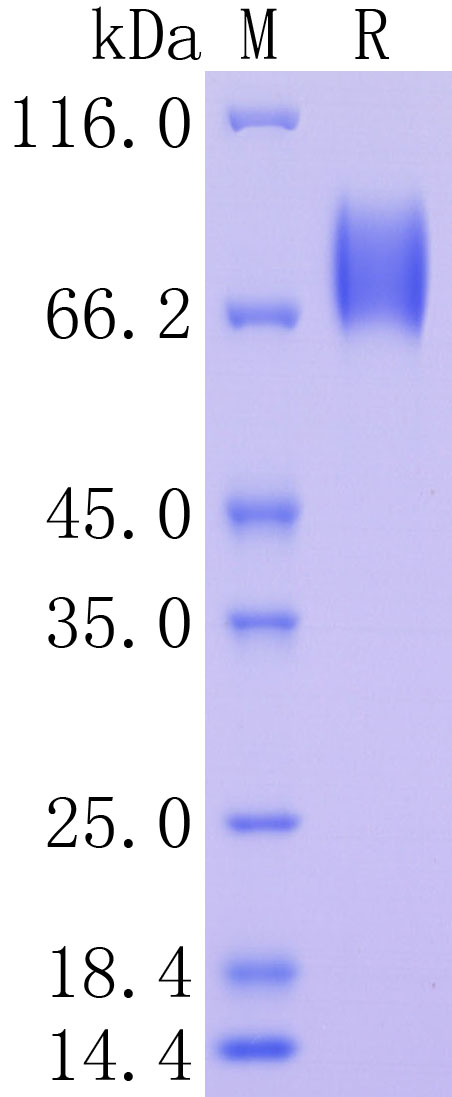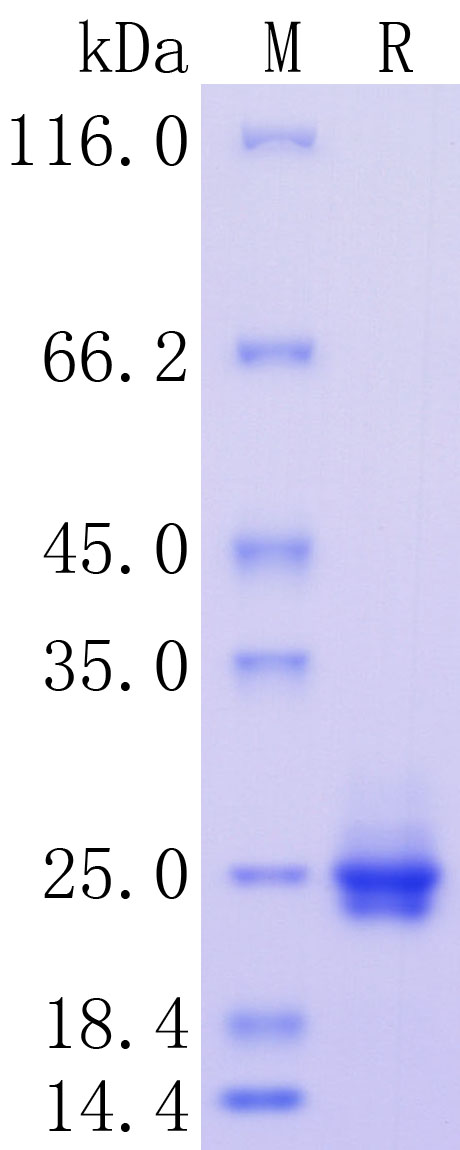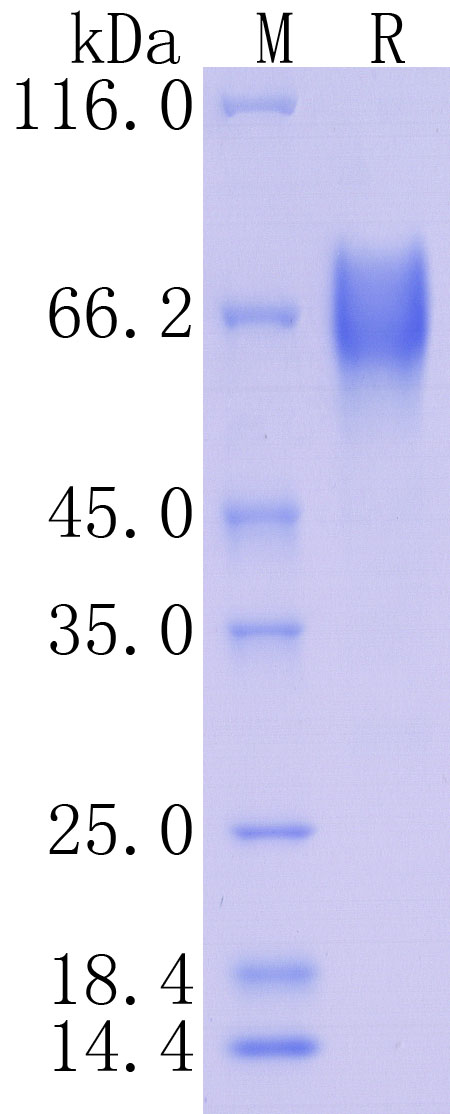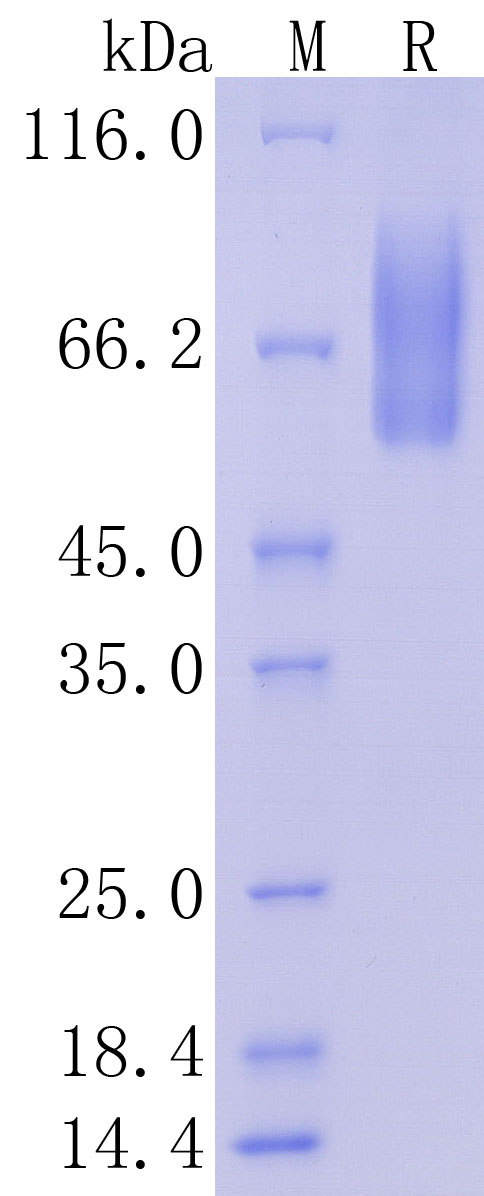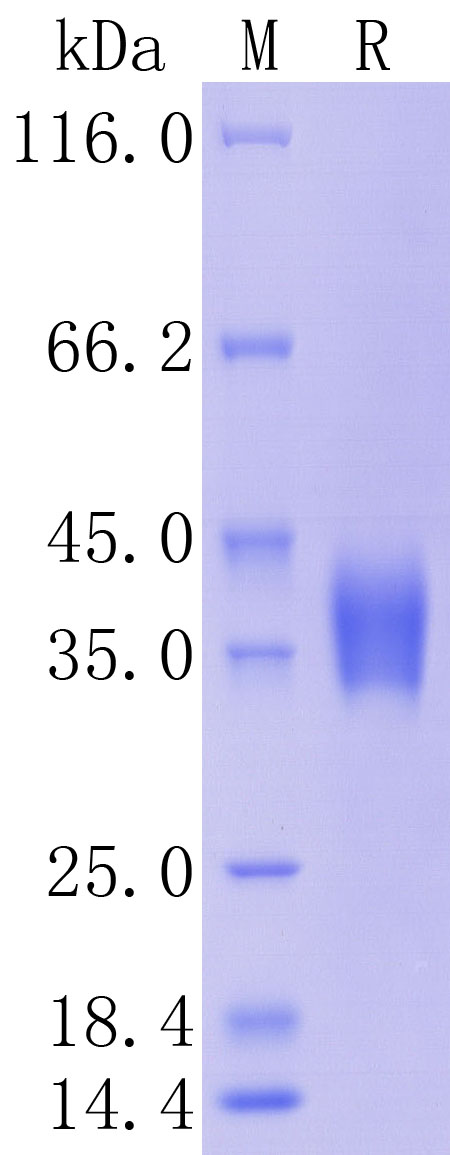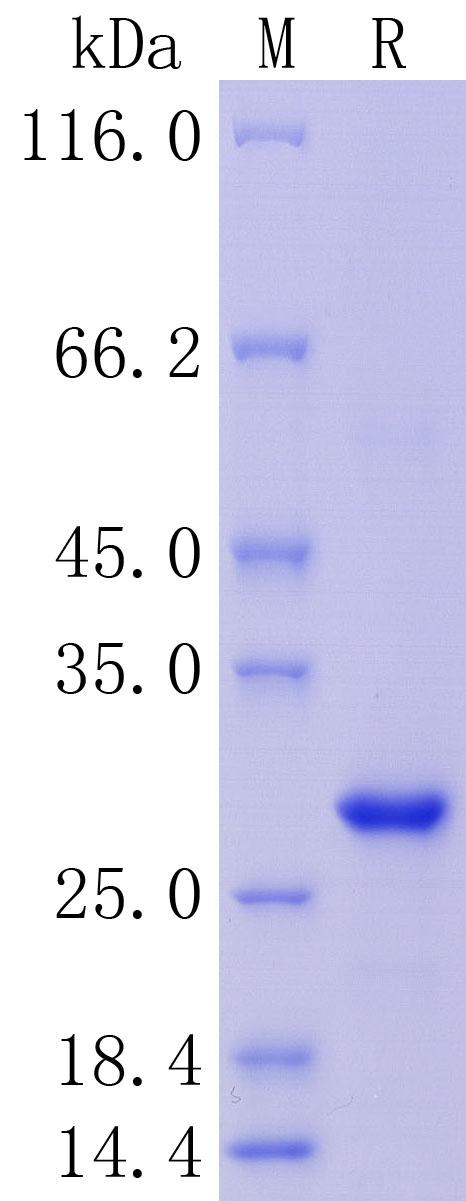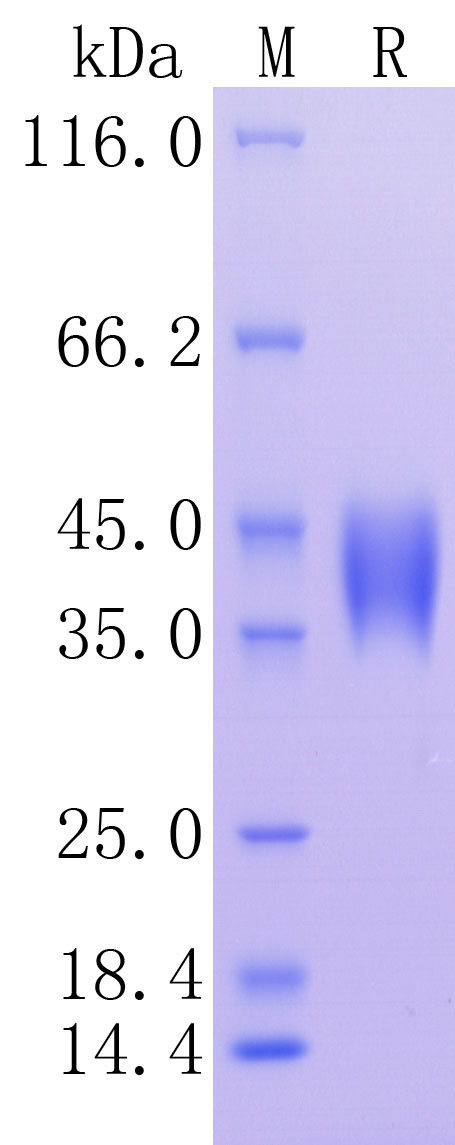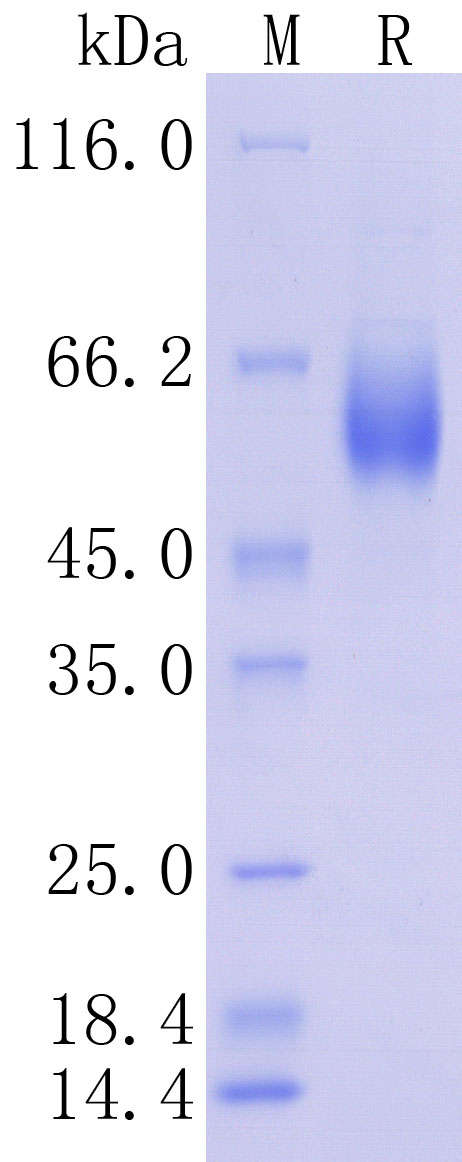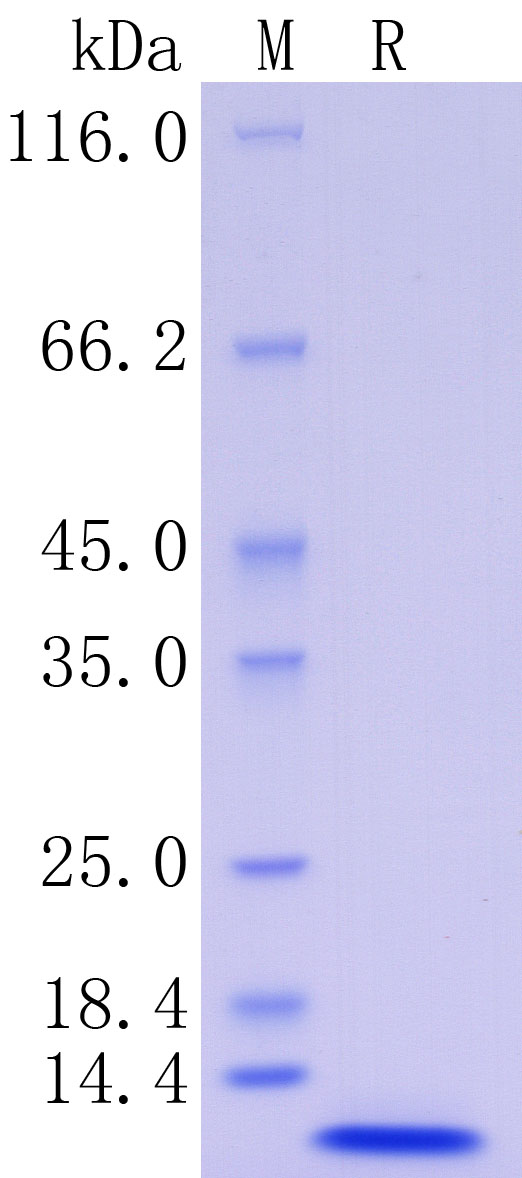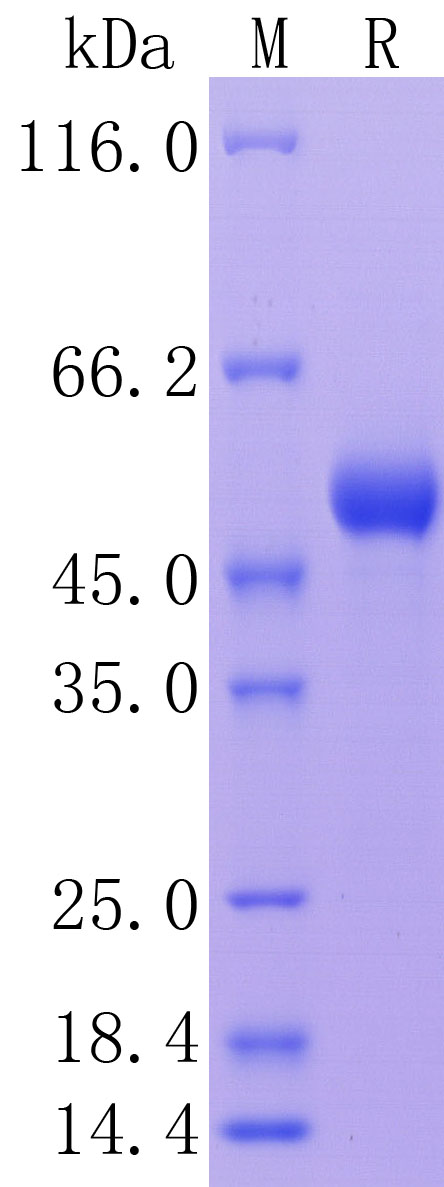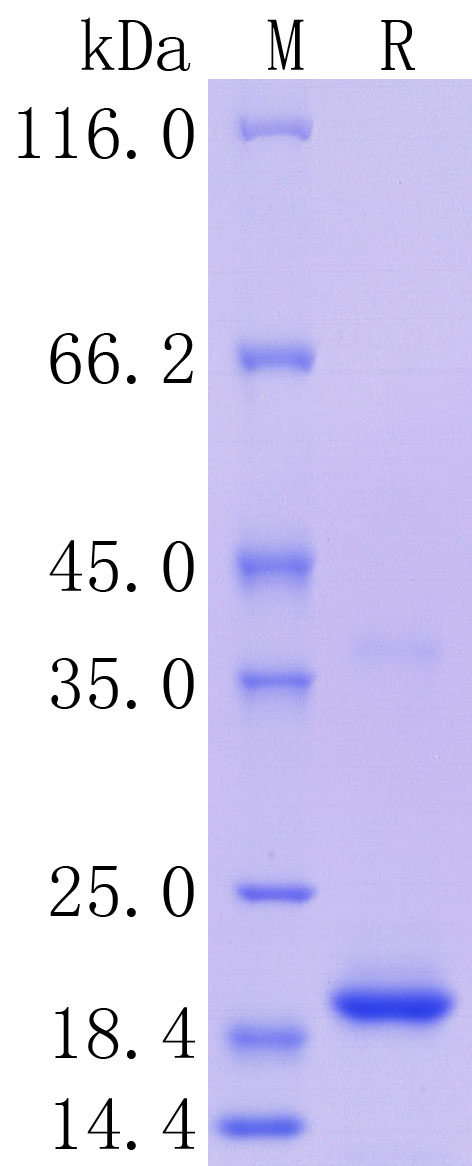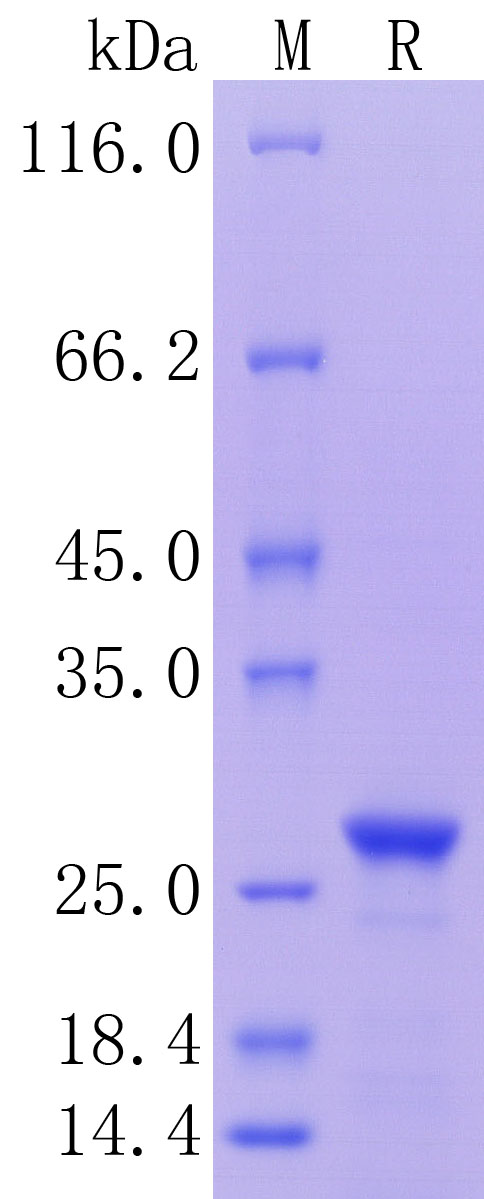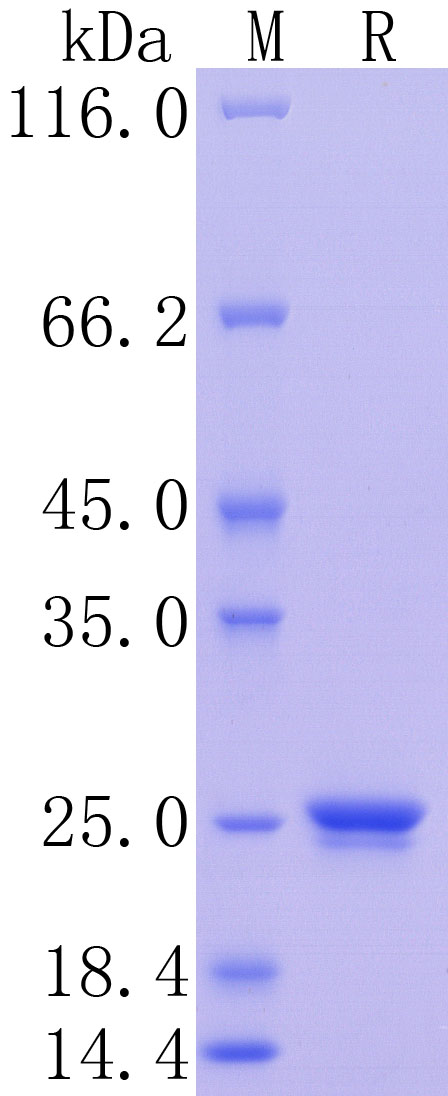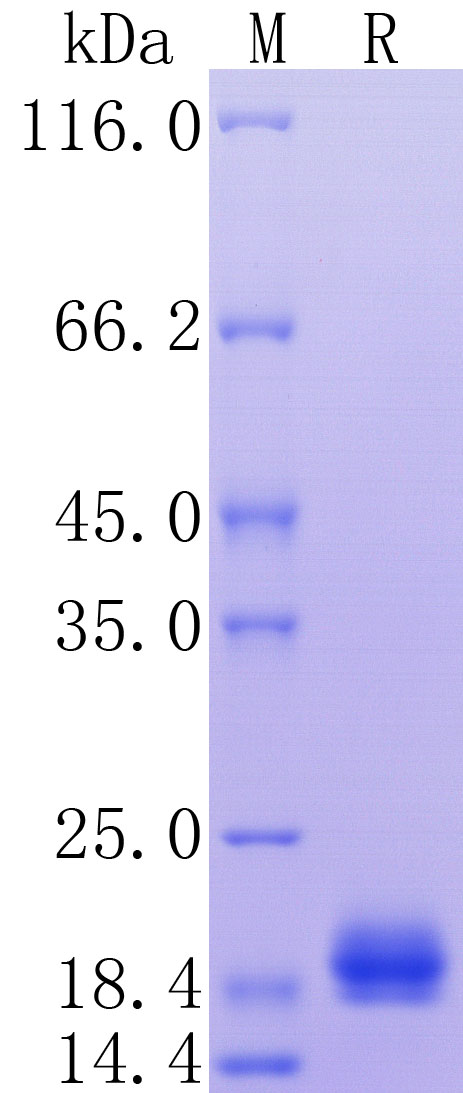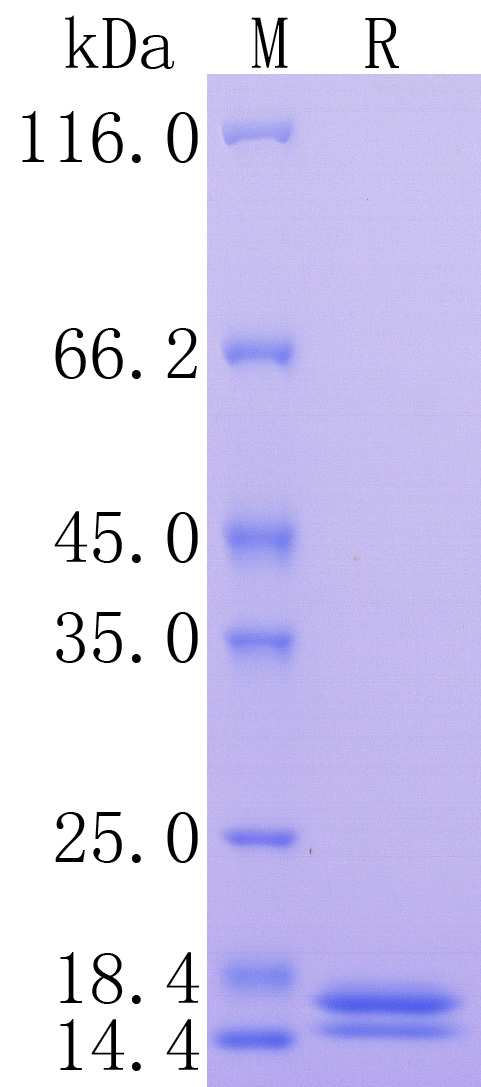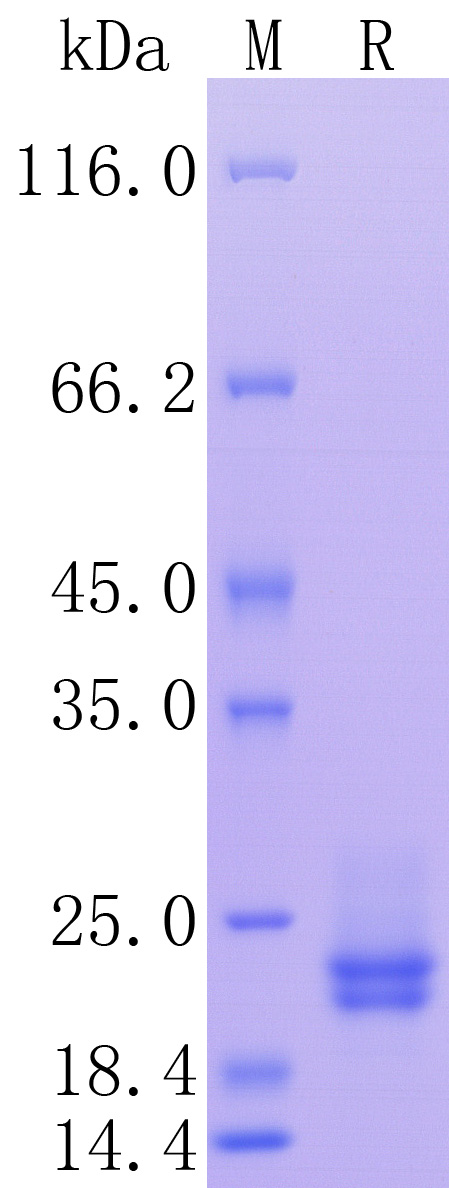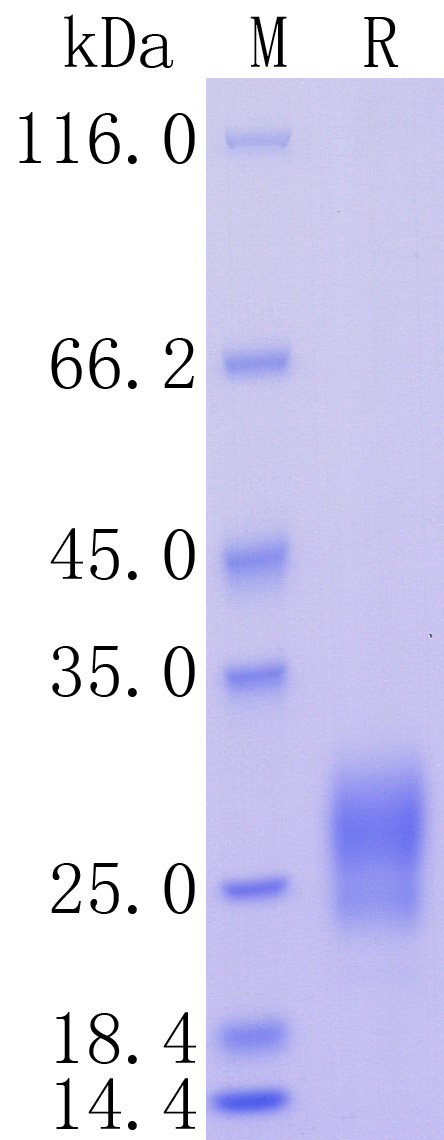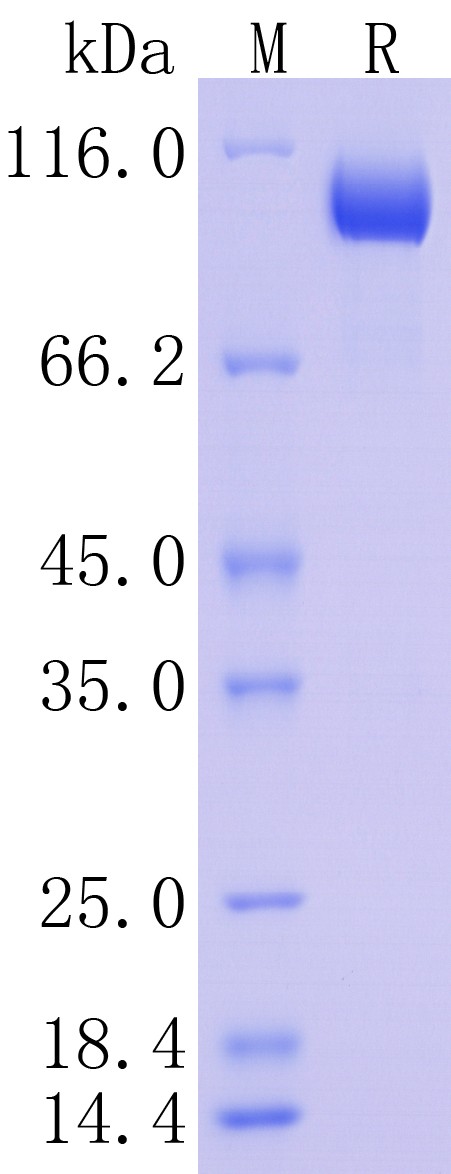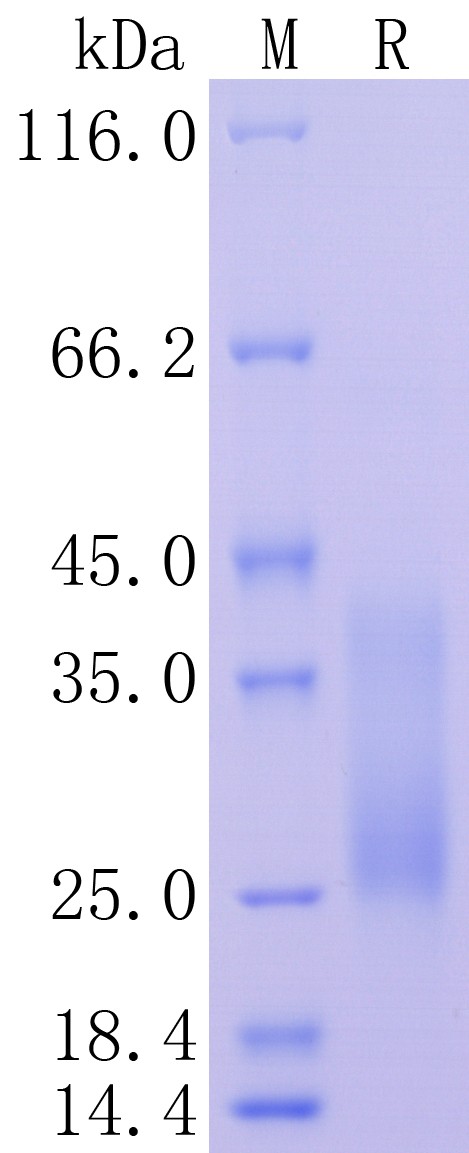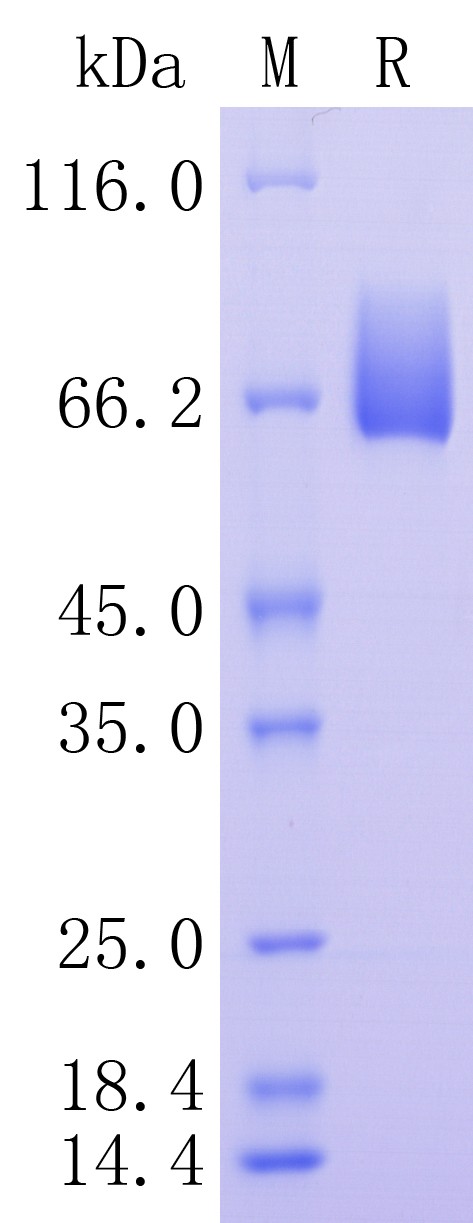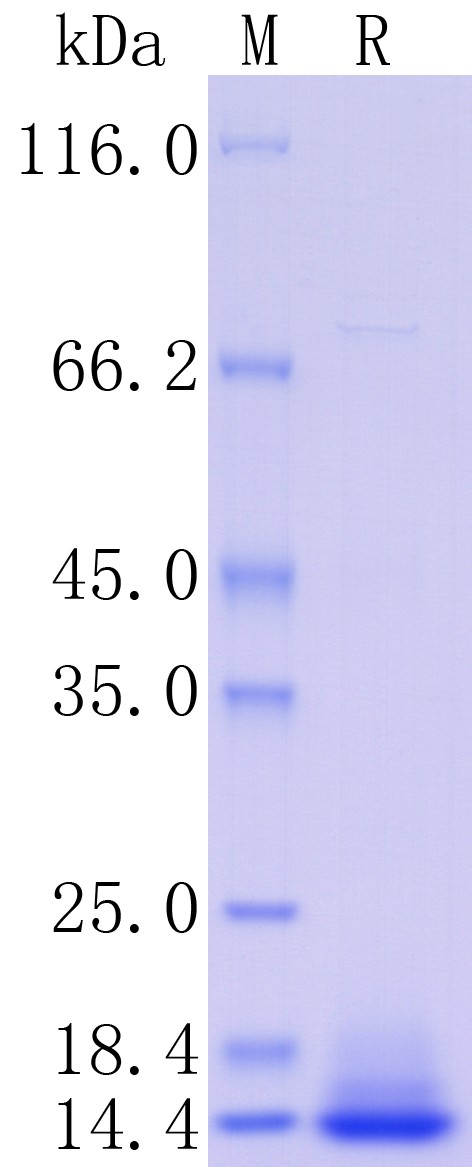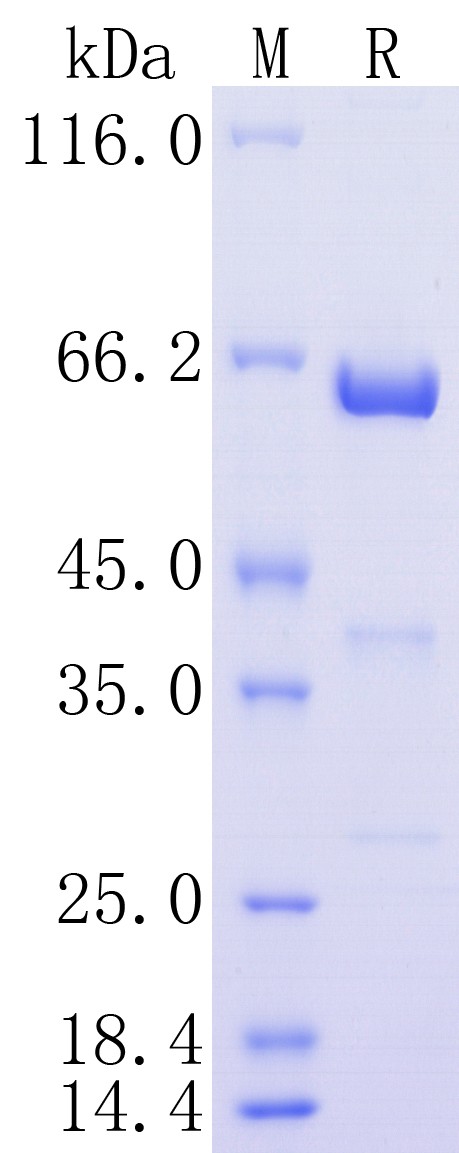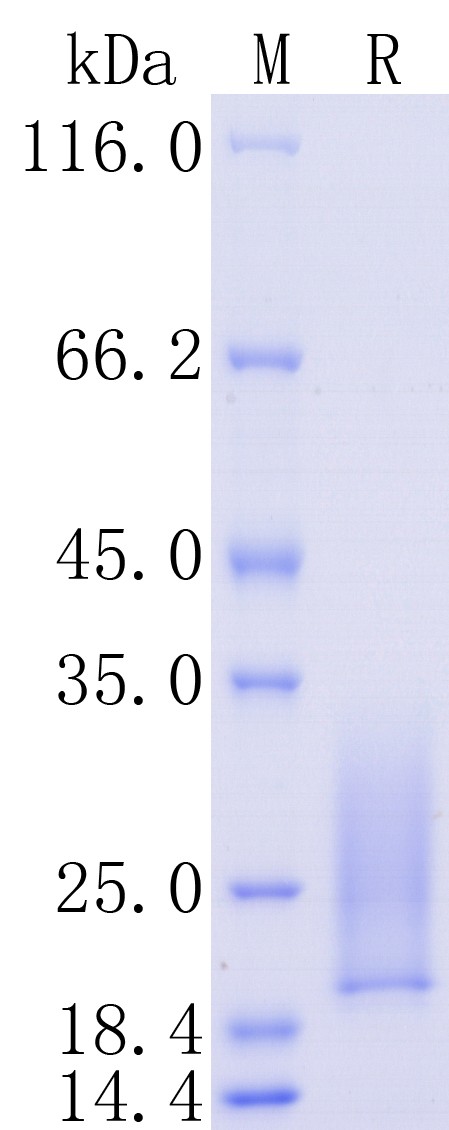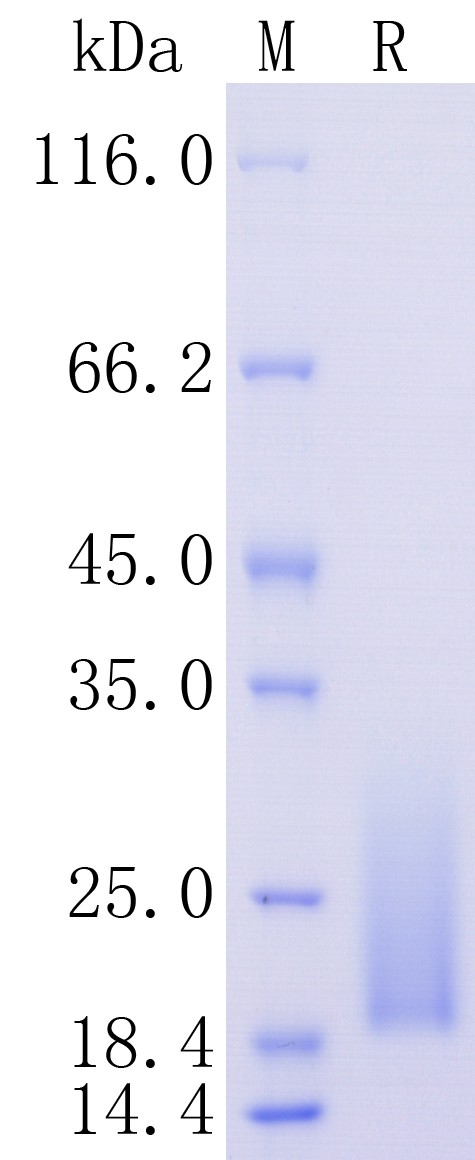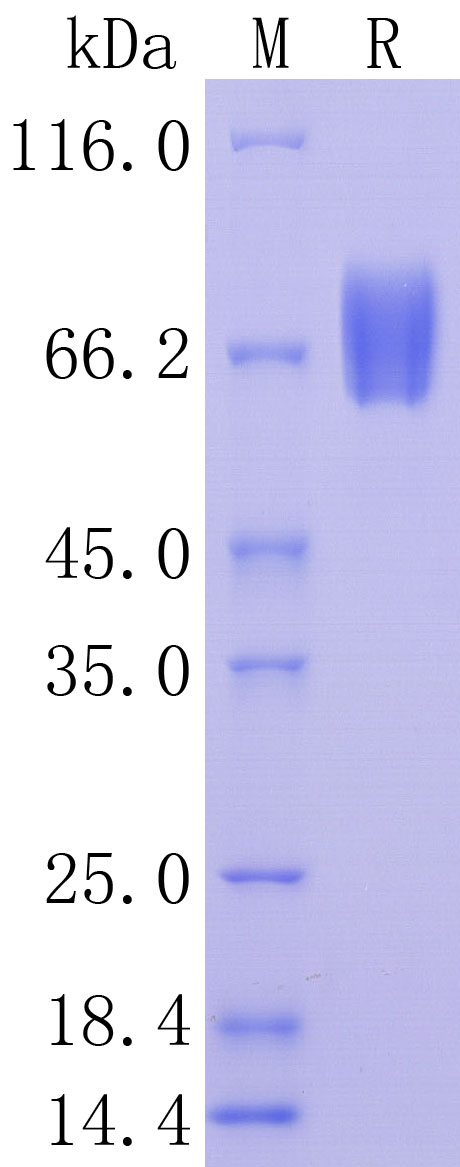Product Information
Product name
Human LAG-3, Tag Free Protein
Catalog No.
HA210934
Predicted molecular mass
46.5 kD
Protein construction description
A DNA sequence encoding the human LAG-3 protein (P18627-1) (Leu 23-Leu 450) was expressed with tag free.
Accession
P18627-1
Protein construction
Source
HEK293
Bio Activity
Testing in progress.
Purity
>95% as determined by SDS-PAGE.
Endotoxin
Less than 1.0 EU per μg by the LAL method.
Formulation
Lyophilized from a 0.2 μm filtered solution of PBS, pH7.4, 5% Trehalose, 5% mannitol.
Species
Human
Background
Lymphocyte-activation gene 3, also known as LAG-3, is a protein which in humans is encoded by the LAG3 gene. LAG3, which was discovered in 1990 and was designated CD223 (cluster of differentiation 223) after the Seventh Human Leucocyte Differentiation Antigen Workshop in 2000, is a cell surface molecule with diverse biologic effects on T cell function. It is an immune checkpoint receptor and as such is the target of various drug development programs by pharmaceutical companies seeking to develop new treatments for cancer and autoimmune disorders. In soluble form it is also being developed as a cancer drug in its own right. LAG3's main ligand is MHC class II, to which it binds with higher affinity than CD4. The protein negatively regulates cellular proliferation, activation, and homeostasis of T cells, in a similar fashion to CTLA-4 and PD-1 and has been reported to play a role in Treg suppressive function. Fibrinogen-like protein1 FGL1, a liver-secreted protein, is another (major) LAG3 functional ligand independent of MHC-II. LAG3 also helps maintain CD8+ T cells in a tolerogenic state and, working with PD-1, helps maintain CD8 exhaustion during chronic viral infection. LAG3 is known to be involved in the maturation and activation of dendritic cells.
Usage guide
Shipping
In general, recombinant proteins are provided as lyophilized powder which are shipped with blue ice. Bulk packages of recombinant proteins are provided as frozen liquid which are shipped with dry ice.
Storage
Please avoid repeated freeze-thaw cycles. Samples are stable for up to twelve months from date of receipt at -20℃ to -80℃ It is recommended that aliquot the reconstituted solution to minimize freeze-thaw cycles.
Reconstitution
Reconstitute at 250 μg/ml in sterile water.
同靶点&同通路的产品
Human CXCL5, Tag Free
Application:
Reactivity: Human
Conjugate:
Human CYLD, C-His Tag
Application:
Reactivity: Human
Conjugate:
Human CEACAM-1/CD66a, C-His Tag (ECD)
Application:
Reactivity: Human
Conjugate:
Human NCAM1/CD56, Tag Free (ECD)
Application:
Reactivity: Human
Conjugate:
Human IL-2, C-His Tag
Application:
Reactivity: Human
Conjugate:
Human BAFF/BLyS/TNFSF13B, Tag Free (ECD)
Application:
Reactivity: Human
Conjugate:
Human MAPK12, C-His Tag
Application:
Reactivity: Human
Conjugate:
Human IFN-gamma R1, C-His Tag (ECD)
Application:
Reactivity: Human
Conjugate:
Human CD272/BTLA, C-His, Flag Tag (ECD)
Application:
Reactivity: Human
Conjugate:
Human CD2, C-His, Flag Tag (ECD)
Application:
Reactivity: Human
Conjugate:
Human HVEM/TNFRSF14, C-Flag Tag
Application:
Reactivity: Human
Conjugate:
Human LAIR1, N-Twin Strep, C-His, Flag Tag
Application:
Reactivity: Human
Conjugate:
Human IL2RG/CD132, C-His Tag (ECD)
Application:
Reactivity: Human
Conjugate:
Human MAPK6, C-His Tag
Application:
Reactivity: Human
Conjugate:
Human ICOS Ligand/B7-H2/ICOSLG, C-His Tag (ECD)
Application:
Reactivity: Human
Conjugate:
Human IL-5, C-His Tag
Application:
Reactivity: Human
Conjugate:
Human TRAF3, C-His Tag
Application:
Reactivity: Human
Conjugate:
Human IL-1 alpha/IL1A, C-His, Flag Tag
Application:
Reactivity: Human
Conjugate:
Human IL-8/CXCL8 Tag Free
Application:
Reactivity: Human
Conjugate:
Human Interferon alpha-2/IFNA2, C-His Tag
Application:
Reactivity: Human
Conjugate:
Human IL-1 RII, C-His Tag (ECD)
Application:
Reactivity: Human
Conjugate:
Human IL-22, C-His, Flag Tag
Application:
Reactivity: Human
Conjugate:
Human PRDM1, N-Twin Strep, C-His, Flag Tag
Application:
Reactivity: Human
Conjugate:
Human IL-4R, C-His, Tag (ECD)
Application:
Reactivity: Human
Conjugate:
Human CXCL10, C-Flag Tag
Application:
Reactivity: Human
Conjugate:
Human TNF-alpha, Tag Free
Application:
Reactivity: Human
Conjugate:
Human TNF-alpha, C-His Tag
Application:
Reactivity: Human
Conjugate:
Human CXCL9, Tag Free
Application:
Reactivity: Human
Conjugate:
Human IL-18, Tag Free
Application:
Reactivity: Human
Conjugate:
Human CCL2/MCP1, Tag Free
Application:
Reactivity: Human
Conjugate:
Human CD5, Tag Free (ECD)
Application:
Reactivity: Human
Conjugate:
Human IL1RA, C-His Tag
Application:
Reactivity: Human
Conjugate:
Human TREM1, C-Hia, Flag Tag
Application:
Reactivity: Human
Conjugate:
Human CTLA-4, C-His Tag
Application:
Reactivity: Human
Conjugate:
Human CD31/PECAM-1, C-His Tag
Application:
Reactivity: Human
Conjugate:
Human TRAIL/TNFSF10, C-His Tag
Application:
Reactivity: Human
Conjugate:
Human CCL17/TARC, Tag Free
Application:
Reactivity: Human
Conjugate:
Human IP-10/CXCL10, Tag Free
Application:
Reactivity: Human
Conjugate:
Human CXCL12/SDF-1, Tag Free
Application:
Reactivity: Human
Conjugate:
Human CCL3/MIP-1, Tag Free
Application:
Reactivity: Human
Conjugate:
Human CXCL2/GRO beta, Tag Free
Application:
Reactivity: Human
Conjugate:
Human Nectin-2, C-His Tag (ECD)
Application:
Reactivity: Human
Conjugate:
Human CD48, C-His Tag
Application:
Reactivity: Human
Conjugate:
Human IL-13, Tag Free
Application:
Reactivity: Human
Conjugate:
Human P-Selectin/CD62P, C-His Tag (ECD)
Application:
Reactivity: Human
Conjugate:
Human VE-cadherin, Tag Free (ECD)
Application:
Reactivity: Human
Conjugate:
Human IL12B/P40, C-His Tag
Application:
Reactivity: Human
Conjugate:
Human CD27/TNFRSF7, Tag Free
Application:
Reactivity: Human
Conjugate:
Human CD28, C-His Tag
Application:
Reactivity: Human
Conjugate:
Human PD-1, C-His Tag
Application:
Reactivity: Human
Conjugate:
Human CD147/Basigin/EMMPRIN, C-His Tag Protein
Application:
Reactivity: Human
Conjugate:
Human VCAM-1 / CD106, C-His Tag Protein
Application:
Reactivity: Human
Conjugate:
Human LILRB4/ILT3, C-His, Flag Tag (ECD)
Application:
Reactivity: Human
Conjugate:
Human IL-18 BPa, C-His Tag
Application:
Reactivity: Human
Conjugate:
Human IL-17F, Tag Free
Application:
Reactivity: Human
Conjugate:
Human CD63, Tag Free (ECD)
Application:
Reactivity: Human
Conjugate:
Human CDC42, Tag Free
Application:
Reactivity: Human
Conjugate:
Human CD207, C-Flag Tag
Application:
Reactivity: Human
Conjugate:
Human ANPEP/CD13, Tag Free (ECD)
Application:
Reactivity: Human
Conjugate:
Human OX40/TNFRSF4, C-His Tag
Application:
Reactivity: Human
Conjugate:
Human ULBP1/NKG2DL1, C-His Tag Protein
Application:
Reactivity: Human
Conjugate:
Human IL-2R alpha, Tag Free
Application:
Reactivity: Human
Conjugate:
Human IL-9, C-Flag Tag
Application:
Reactivity: Human
Conjugate:
Human CD2, N-Twin Strep, C-His, Flag Tag
Application:
Reactivity: Human
Conjugate:
Human IL-2RB/CD122, C-His Tag (ECD)
Application:
Reactivity: Human
Conjugate:
Human IL-21, C-His, Flag Tag
Application:
Reactivity: Human
Conjugate:
Human IL-7, C-His, Flag Tag
Application:
Reactivity: Human
Conjugate:
Human CD58/LFA-3, C-His Tag (ECD)
Application:
Reactivity: Human
Conjugate:
Human LILRB2/CD85d/ILT4, C-His, Flag Tag (ECD)
Application:
Reactivity: Human
Conjugate:
Human IFN-gamma, C-His Tag
Application:
Reactivity: Human
Conjugate:
Human CXCL1, Tag Free
Application:
Reactivity: Human
Conjugate:
Human 4-1BB/TNFRSF9, C-His Tag
Application:
Reactivity: Human
Conjugate:
Human CD40 Ligand/TNFSF5, Tag Free (ECD)
Application:
Reactivity: Human
Conjugate:
Human Siglec-7/CD328, C-His (ECD)
Application:
Reactivity: Human
Conjugate:
Human CSK, C-His Tag
Application:
Reactivity: Human
Conjugate:
Human IL-33, C-His Tag
Application:
Reactivity: Human
Conjugate:
Human TNF RI/TNFRSF1A, Tag Free (ECD)
Application:
Reactivity: Human
Conjugate:
Human IL-1 beta/IL1B, C-His Tag
Application:
Reactivity: Human
Conjugate:
Human IL17RA/CD217, C-His Tag (ECD)
Application:
Reactivity: Human
Conjugate:
Human IL1RL1/DER4/ST2, C-hFc, His (ECD)
Application:
Reactivity: Human
Conjugate:
Human B7-DC/PD-L2/CD273, C-Flag Tag (ECD)
Application:
Reactivity: Human
Conjugate:
Human IFN-alpha/beta R2, C-His Tag (ECD)
Application:
Reactivity: Human
Conjugate:
Human HCLS1, N-Strep II, C-His Tag
Application:
Reactivity: Human
Conjugate:
Human IFN-alpha/beta R1, C-His (ECD)
Application:
Reactivity: Human
Conjugate:
Human IL-6, C-His Tag
Application:
Reactivity: Human
Conjugate:
Human IL-6R, C-His (ECD)
Application:
Reactivity: Human
Conjugate:
Human CD30/TNFRSF8, C-His, Flag Tag (ECD)
Application:
Reactivity: Human
Conjugate:
Human EPCR/PROCR/CD201, C-His, Flag Tag (ECD)
Application:
Reactivity: Human
Conjugate:
Human CDCP1/CD318, N-Twin Strep, C-His, Flag Tag
Application:
Reactivity: Human
Conjugate:
Human CD200, C-His Tag (ECD)
Application:
Reactivity: Human
Conjugate:
Human IL1RL1/DER4/ST2, C-His (ECD)
Application:
Reactivity: Human
Conjugate:
Human EGF, Tag Free
Application:
Reactivity: Human
Conjugate:
Human IL5RA, C-His Tag (ECD)
Application:
Reactivity: Human
Conjugate:
Human IL-10, C-His Tag
Application:
Reactivity: Human
Conjugate:
Human IL-17A, Tag Free
Application:
Reactivity: Human
Conjugate:
Human GADD45A, N-Twin Strep, C-His, Flag Tag
Application:
Reactivity: Human
Conjugate:
Human RAC1, C-Flag Tag
Application:
Reactivity: Human
Conjugate:
Human IL-4, Tag Free
Application:
Reactivity: Human
Conjugate:
Human IL-2, Tag Free
Application:
Reactivity: Human
Conjugate:
Human IL-6, Tag Free
Application:
Reactivity: Human
Conjugate:
Human IL-7, Tag Free
Application:
Reactivity: Human
Conjugate:
Human TIE2/TEK, C-His, Flag Tag (ECD)
Application:
Reactivity: Human
Conjugate:
Human HVEM/TNFRSF14, Tag Free (ECD)
Application:
Reactivity: Human
Conjugate:
Human ICAM-1/CD54, C-His Tag (ECD)
Application:
Reactivity: Human
Conjugate:
Human CCL11/Eotaxin, Tag Free
Application:
Reactivity: Human
Conjugate:
Human PD-L1/B7-H1, C-hFc Tag
Application:
Reactivity: Human
Conjugate:
Human E-Cadherin, C-His Tag (ECD)
Application:
Reactivity: Human
Conjugate:
Human 5'-nucleotidase/CD73/NT5E, C-His Tag
Application:
Reactivity: Human
Conjugate:
Human IL-16, C-His Tag
Application:
Reactivity: Human
Conjugate:
Human IL-3, Tag Free
Application:
Reactivity: Human
Conjugate:
Human Siglec-3/CD33, Tag Free
Application:
Reactivity: Human
Conjugate:
Human TNF RII/TNFRSF1B, C-His (ECD)
Application:
Reactivity: Human
Conjugate:
Human Syndecan-1/CD138, C-His Tag (ECD) Protein
Application:
Reactivity: Human
Conjugate:
Human PD-L1/B7-H1, C-His Tag Protein
Application:
Reactivity: Human
Conjugate:
Human B7-H3, C-His Tag (ECD) Protein
Application:
Reactivity: Human
Conjugate:
Human IL-13 R alpha 2/IL13RA2, Tag Free (ECD) Protein
Application:
Reactivity: Human
Conjugate:
Human IL-29/IFN-lambda 1, Tag Free Protein
Application:
Reactivity: Human
Conjugate:
Human Osteoprotegerin / TNFRSF11B, C-His Tag Protein
Application:
Reactivity: Human
Conjugate:
Human IL-10, Tag Free Protein
Application:
Reactivity: Human
Conjugate:
Human IL-31, C-Flag Tag Protein
Application:
Reactivity: Human
Conjugate:
Human LILRB1/CD85j/ILT2, C-His, Flag Tag (ECD)
Application:
Reactivity: Human
Conjugate:
Human IL12RB1, C-His Tag (ECD)
Application:
Reactivity: Human
Conjugate:
Human GITR/TNFRSF18/AITR, C-Flag Tag (ECD)
Application:
Reactivity: Human
Conjugate:
Human CD155/PVR, C-His Tag (ECD) Protein
Application:
Reactivity: Human
Conjugate:




